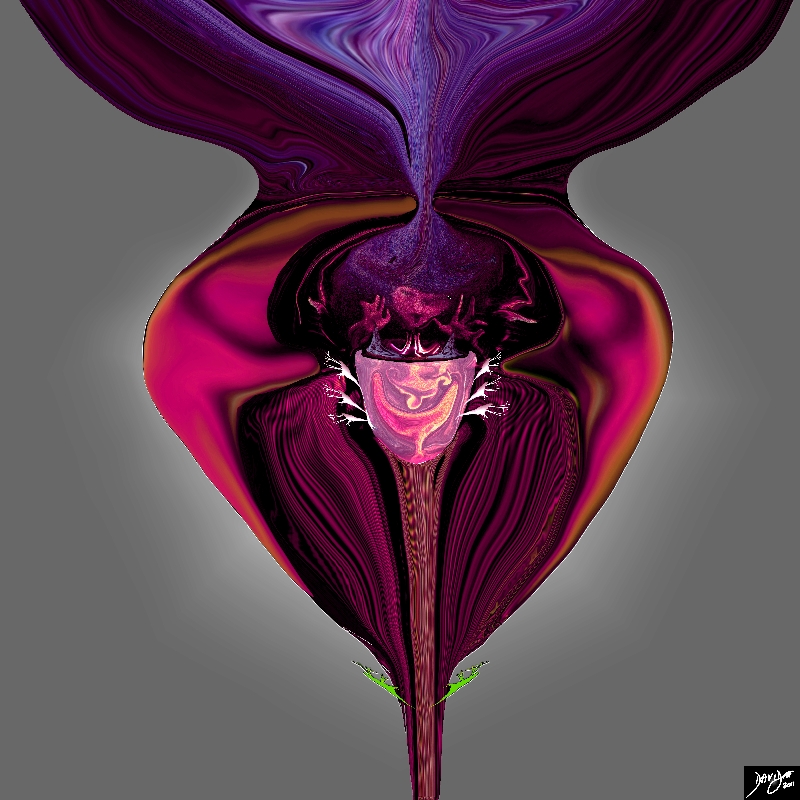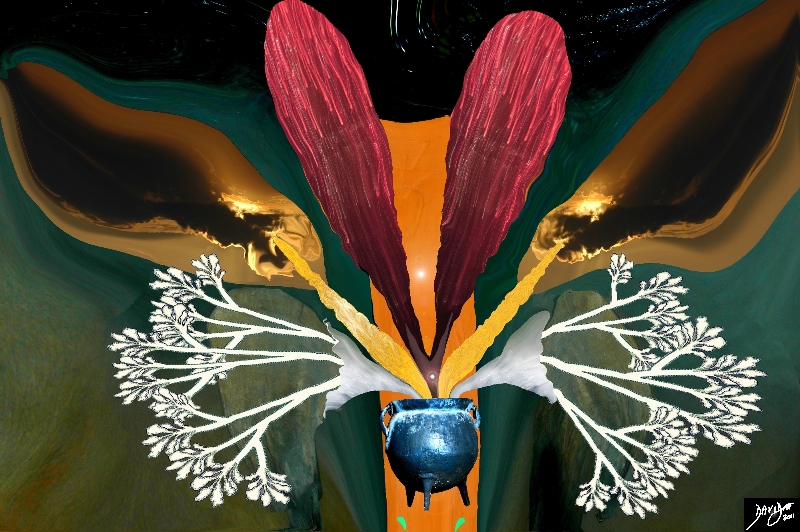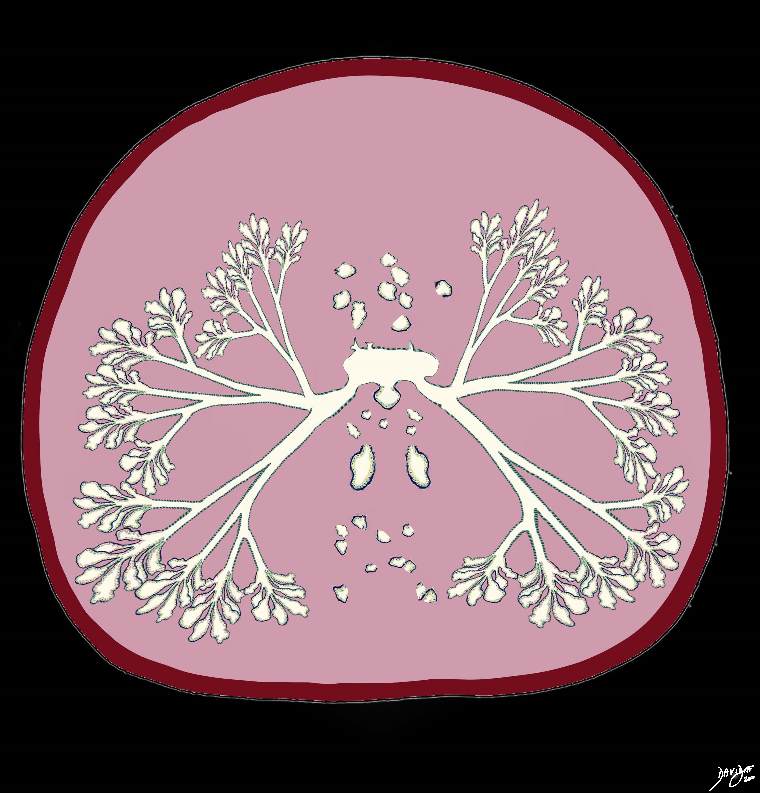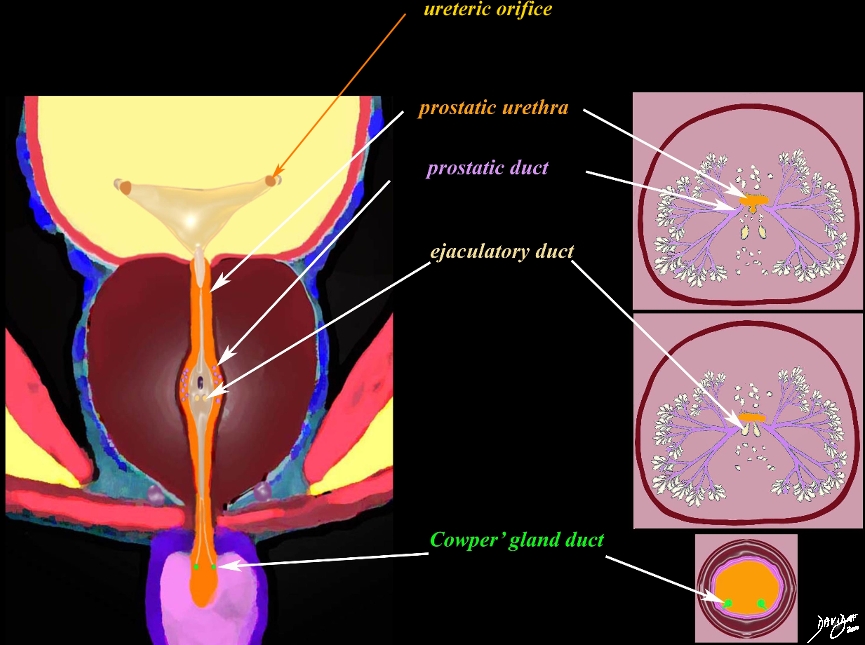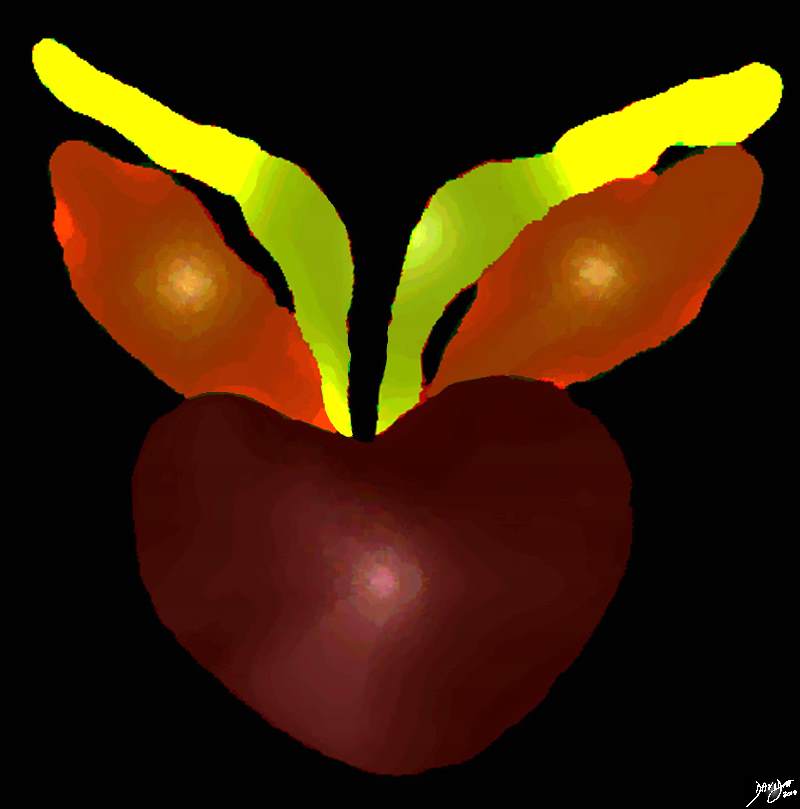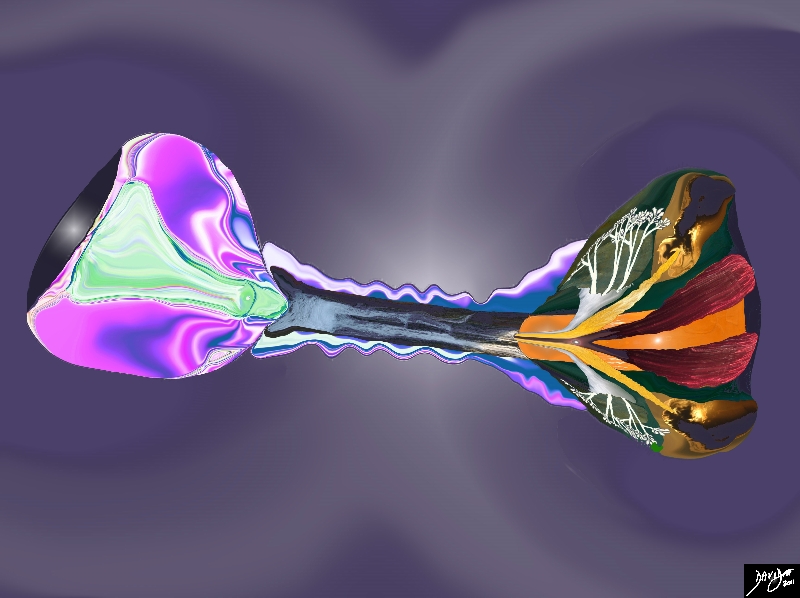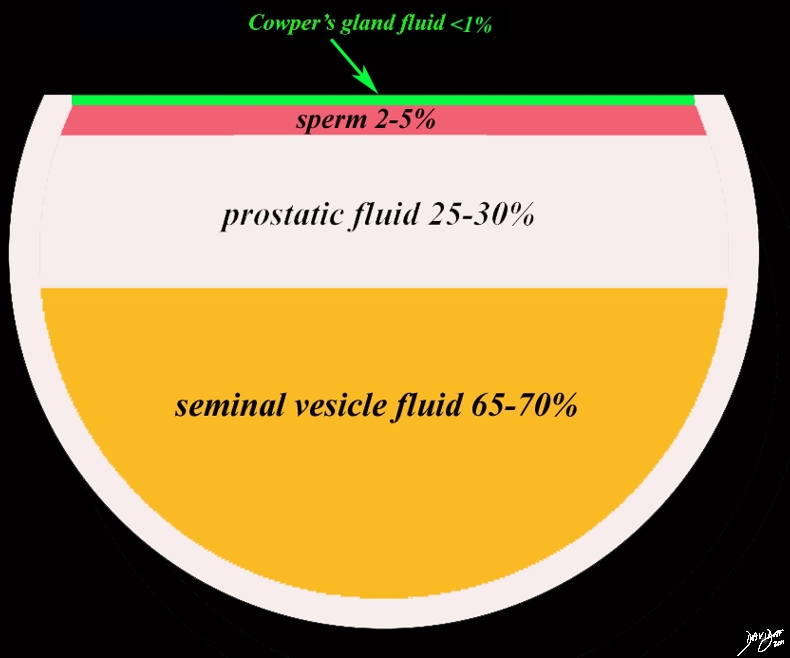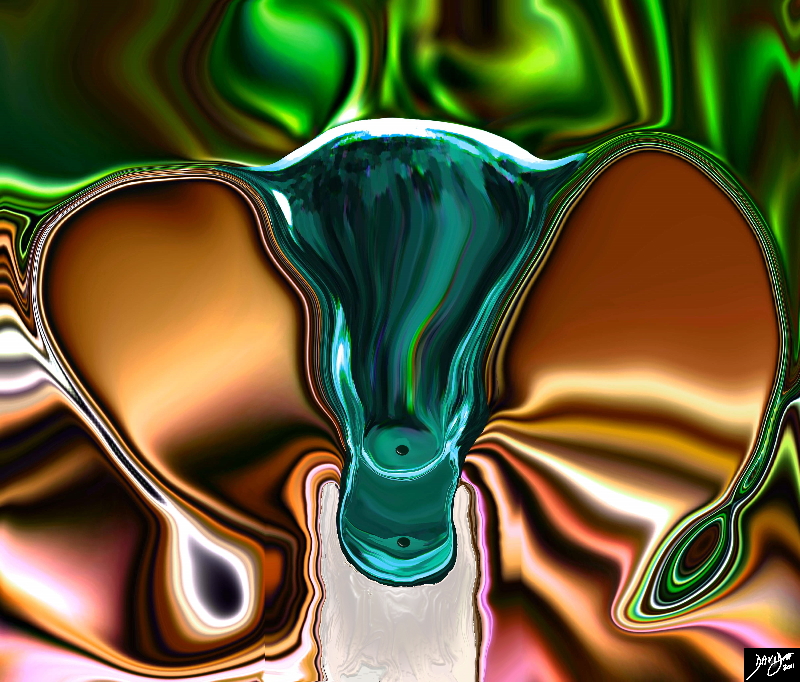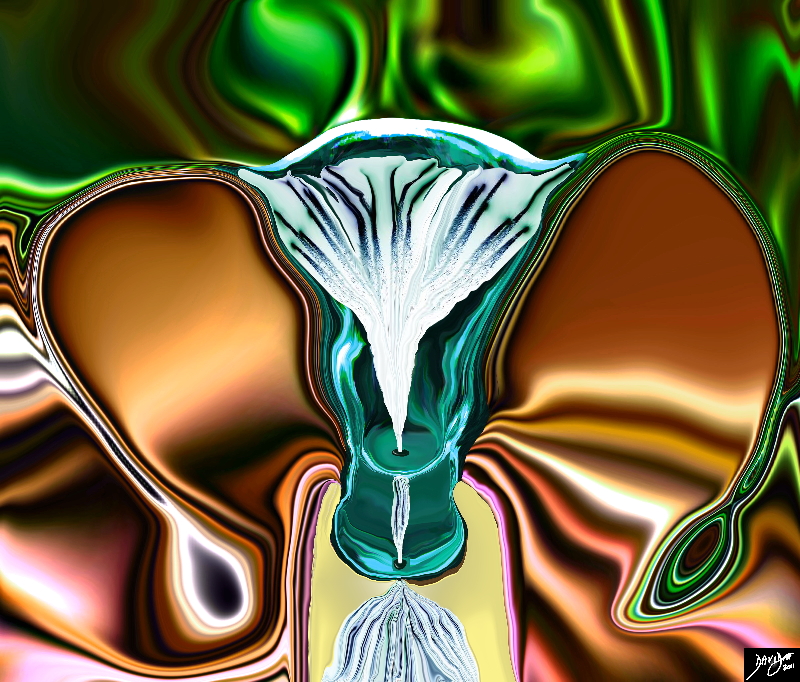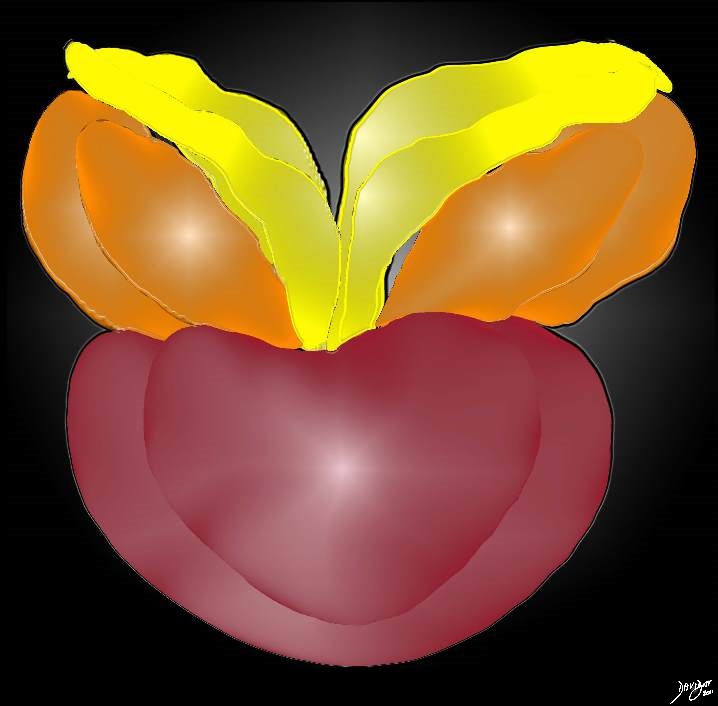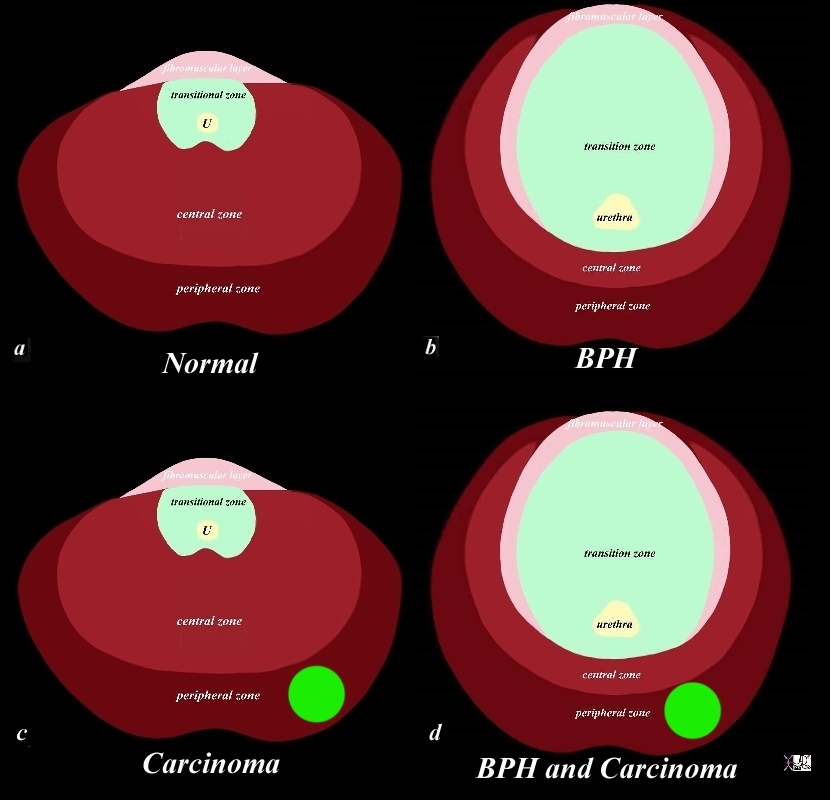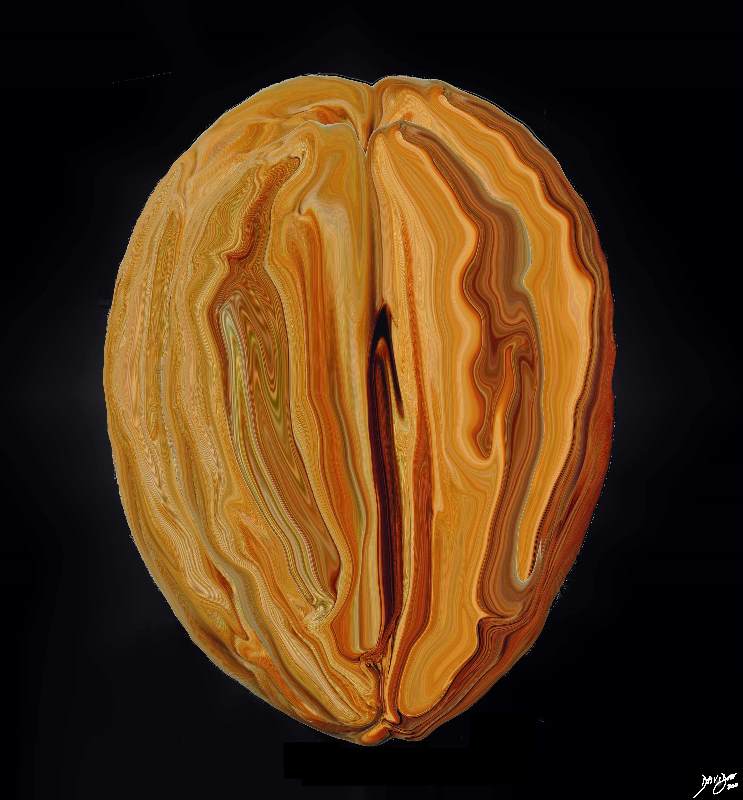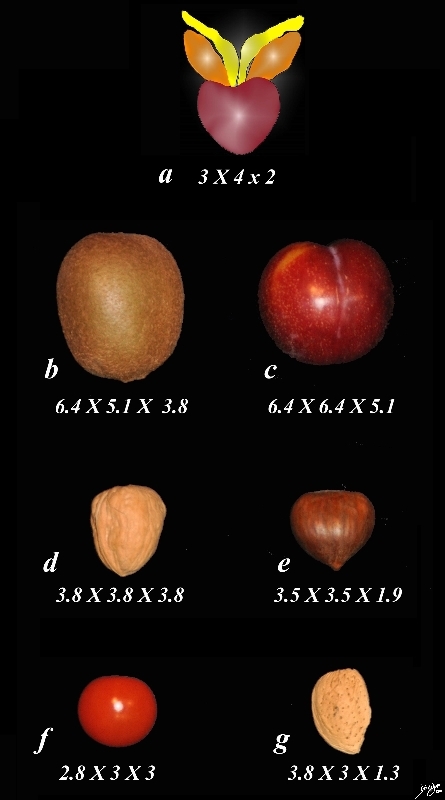Art of the Prostate
Ashley Davidoff MD
Copyright 2011
Introduction
|
Mixing Pot For Love Potions |
| The prostatic urethra serves as the mixing pot for the components of semen by acting as the receptacle of secretions from the prostate itself, the seminal vesicles and the vas deferentia. This diagram shows the region of the verumontanum which is the site where the mixing pot stands receiving ejaculatory ducts and the region of the 10-15 prostatic ducts empty as well. The prostatic urethra is outlined in orange.Courtesy Ashley Davidoff MD Copyright 2011 All rights reserved 83101b04b03.8s |
|
Innards of the Factory Bubble Bubble Boil and Trouble |
| The diagram reflects an artistic rendition of the prostate with the component parts participating in the production of semen. There is a sense that the wavy forms of sperm medial to the prostatic urethra (orange) are making their way in the beginning of the frantic race to the ovum The contributions from the seminal vesicles are seen as a paired structure overlaid in white just lateral to the sperm. The contributions from the prostate are seens as purple and orange mixing bowls pouring their contribution into the prostatic urethra. A faint hint of green is the contribution from Cowper?s glands (aka bulbourethral glands).Image Courtesy Ashley Davidoff Copyright 2010 83100c119.8s |
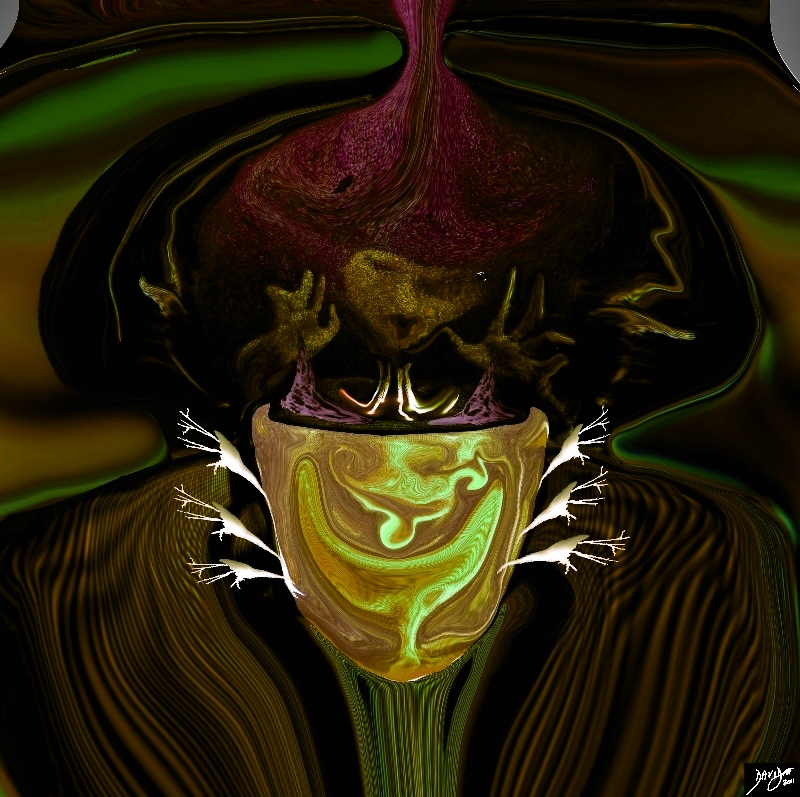 A Magnified View of the Magical Mixing of Mlae Moistures A Magnified View of the Magical Mixing of Mlae Moistures |
|
Courtesy Ashley Davidoff MD Copyright 2011 99655b08b04b06b.81s |
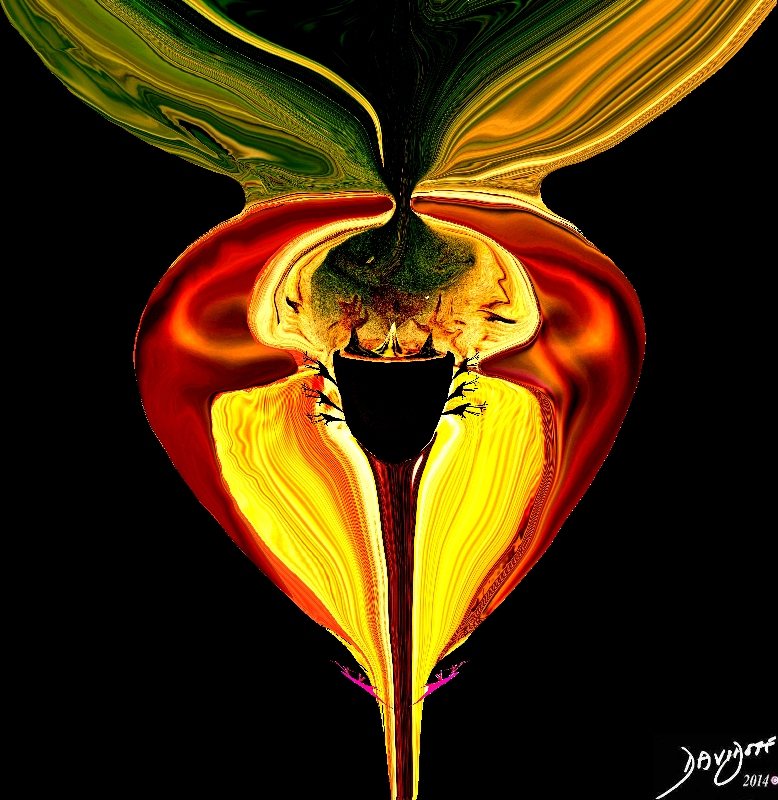 Things are Hotting Up Things are Hotting Up
An Urgency |
| Things are getting urgent to get the brew ready for export and packaged for its adventurous journey
Courtesy Ashley Davidoff MD Copyright 2011 99655b08b05b03.8s |
|
Rush to Get it Ready and Out |
| The prostatic urethra serves as the mixing pot for the components of semen by acting as the receptacle of secretions from the prostate itself, the seminal vesicles and the vas deferentia. This diagram shows the region of the verumontanum which is the site where the mixing pot stands receiving sperm from the testes via the vas deferentia (red), the secretions of the seminal vesicles (orange) and the secretions of the prostate gland white). The last component contributed by the bulbourethral glands (Cowpers?s glands ? green) joins the secretions in the penile urethra to form semen.Courtesy Ashley Davidoff MD Copyright 2011 All rights reserved 83101b17.2k.8s |
|
Release and Ecstasy |
| The diagram reveals the process of ejaculation when the sluice gates open under sympathetic control and semen is transported from the prostatic urethra to the penile urethra and exiting through the meatus. The smooth muscle of the prostate participates in the ejaculation process by contracting forcing the semen into the urethra. The secretions proceed down the penile urethra and out. Courtesy Ashley Davidoff MD Copyright 2011 All rights reserved 83101b29k.8s |
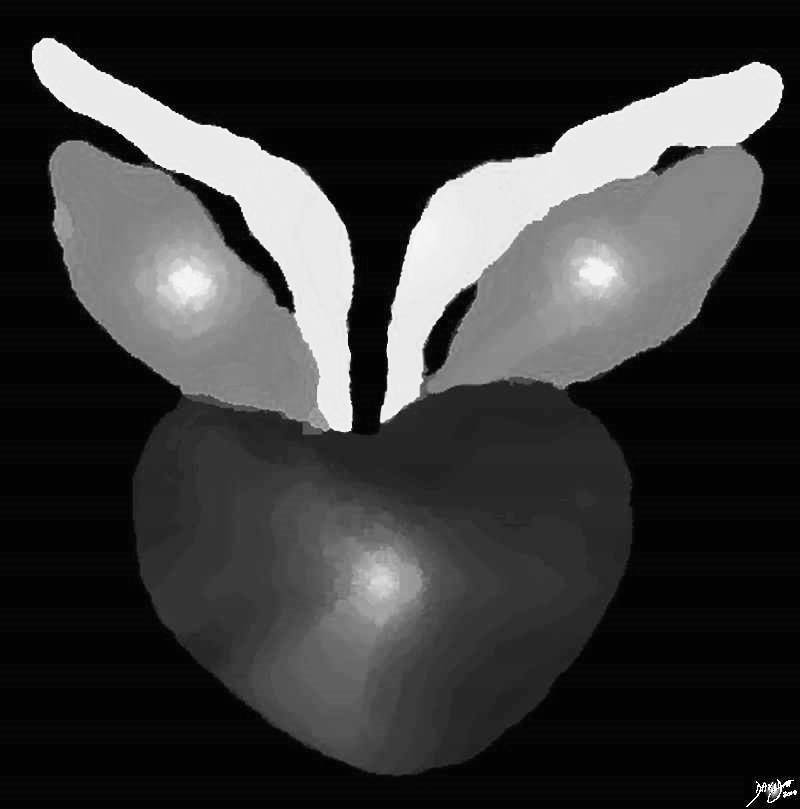 Resting Before the Hot Date Resting Before the Hot Date |
|
Courtesy Ashley Davidof MD Copyright 2010 99380b01.4.8sg |
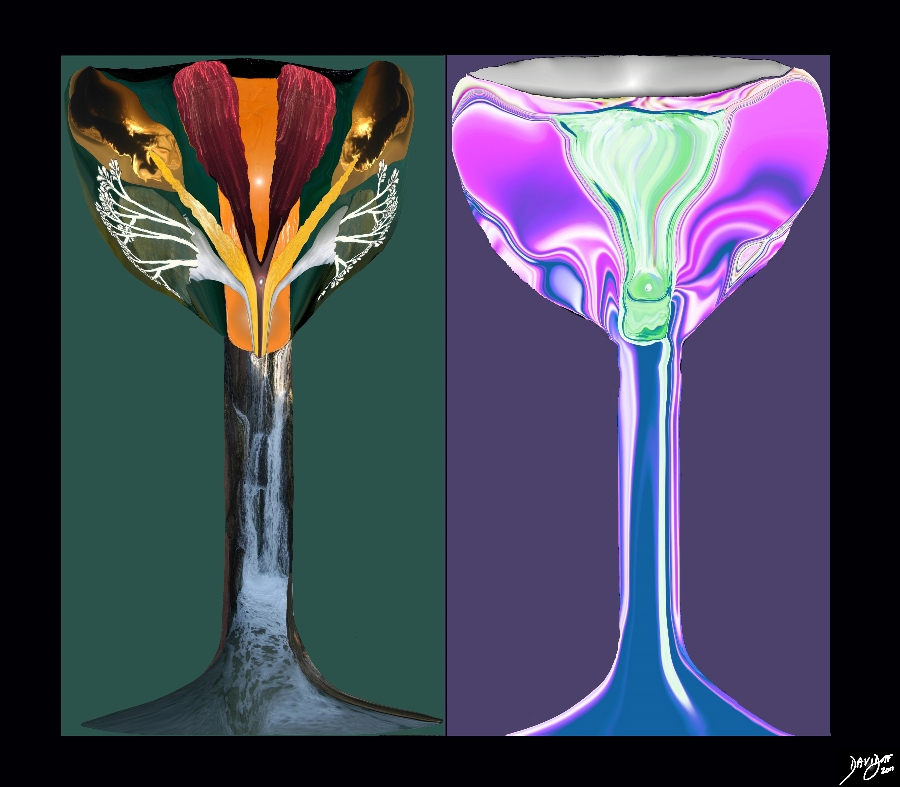 Over a Glass Wine Over a Glass Wine
Building Passions |
|
The artistic rendering shows the male and female features in the form of two glasses of wine Image Courtesy Ashley DAvidoff MD Copyright 2011 83101b26kcS03.9s |
|
The Coagulum on the Cervix Creamy White and Sticky |
|
The diagram depicts the creamy coagulated ejaculate attached and adherent to the cervix. In the period following, the semen buffers the acidic environment of the vagina ensuring a safer less acidic environment for the sperm. The citric acid from the prostatic component of the secretion chelates calcium and assists the prostate specific antigen enzymes liquefy the semen in order to release the sperm. Courtesy Ashley Davidoff MD Copyright 2011 46701b03.53ks01s04b.8s |
|
Liquifaction Release ? Free at Last And the Race is On |
|
The diagram depicts the liquefaction of the coagulated ejaculate now becoming a pale cream releasing the 40-250million sperm who have one mission in mind ? the race to glory and fertilization of the ovum. With artistic licence the diagram amplifies ?free at last? and then the race, showing the sperm storming the gate of the external os of the cervix, ? through the cervical canal and then into the wide open space of the endometrial canal and looking for the tiny opening of the Fallopian tubes where fertilization will finally take place. Courtesy Ashley Davidoff MD Copyright 2011 All rights reserved 46701b03.53ks10s03.8s |
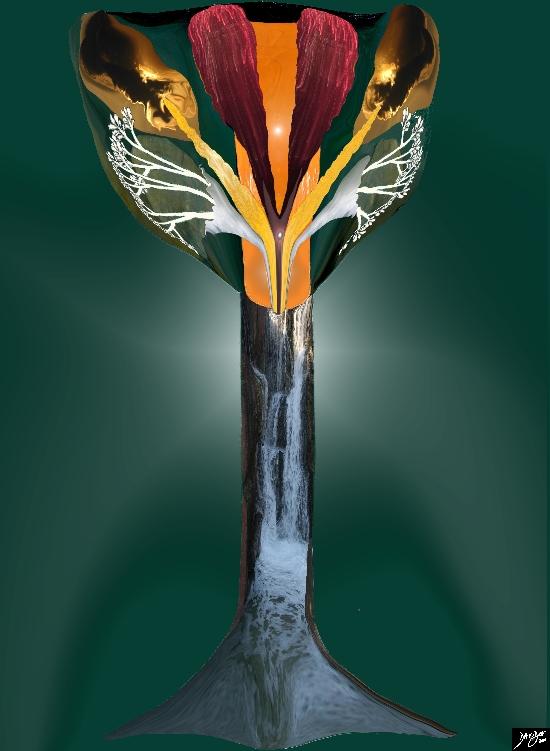 And All I had was A Picture in My Mind of My Prime And All I had was A Picture in My Mind of My Prime |
|
Courtesy Ashley Davidoff MD Copyright 2011 All rights reserved 83101b29k.8s |
DOMElement Object
(
[schemaTypeInfo] =>
[tagName] => table
[firstElementChild] => (object value omitted)
[lastElementChild] => (object value omitted)
[childElementCount] => 1
[previousElementSibling] => (object value omitted)
[nextElementSibling] =>
[nodeName] => table
[nodeValue] =>
Shape
The diagram depicts the chestnut and correlative artistic renderings in the A-P (a,b), transverse (c,d) and sagittal projections (e,f). The rounded anterior and lateral borders and flattened posterior border fit perfectly, and the heart shape in the frontal projection is also the shape of the chestnut.
Courtesy Ashley Davidoff MD Copyright 2011 99662c04L.8s
[nodeType] => 1
[parentNode] => (object value omitted)
[childNodes] => (object value omitted)
[firstChild] => (object value omitted)
[lastChild] => (object value omitted)
[previousSibling] => (object value omitted)
[nextSibling] => (object value omitted)
[attributes] => (object value omitted)
[ownerDocument] => (object value omitted)
[namespaceURI] =>
[prefix] =>
[localName] => table
[baseURI] =>
[textContent] =>
Shape
The diagram depicts the chestnut and correlative artistic renderings in the A-P (a,b), transverse (c,d) and sagittal projections (e,f). The rounded anterior and lateral borders and flattened posterior border fit perfectly, and the heart shape in the frontal projection is also the shape of the chestnut.
Courtesy Ashley Davidoff MD Copyright 2011 99662c04L.8s
)
DOMElement Object
(
[schemaTypeInfo] =>
[tagName] => td
[firstElementChild] => (object value omitted)
[lastElementChild] => (object value omitted)
[childElementCount] => 2
[previousElementSibling] =>
[nextElementSibling] =>
[nodeName] => td
[nodeValue] =>
The diagram depicts the chestnut and correlative artistic renderings in the A-P (a,b), transverse (c,d) and sagittal projections (e,f). The rounded anterior and lateral borders and flattened posterior border fit perfectly, and the heart shape in the frontal projection is also the shape of the chestnut.
Courtesy Ashley Davidoff MD Copyright 2011 99662c04L.8s
[nodeType] => 1
[parentNode] => (object value omitted)
[childNodes] => (object value omitted)
[firstChild] => (object value omitted)
[lastChild] => (object value omitted)
[previousSibling] => (object value omitted)
[nextSibling] => (object value omitted)
[attributes] => (object value omitted)
[ownerDocument] => (object value omitted)
[namespaceURI] =>
[prefix] =>
[localName] => td
[baseURI] =>
[textContent] =>
The diagram depicts the chestnut and correlative artistic renderings in the A-P (a,b), transverse (c,d) and sagittal projections (e,f). The rounded anterior and lateral borders and flattened posterior border fit perfectly, and the heart shape in the frontal projection is also the shape of the chestnut.
Courtesy Ashley Davidoff MD Copyright 2011 99662c04L.8s
)
DOMElement Object
(
[schemaTypeInfo] =>
[tagName] => td
[firstElementChild] => (object value omitted)
[lastElementChild] => (object value omitted)
[childElementCount] => 2
[previousElementSibling] =>
[nextElementSibling] =>
[nodeName] => td
[nodeValue] => Shape
[nodeType] => 1
[parentNode] => (object value omitted)
[childNodes] => (object value omitted)
[firstChild] => (object value omitted)
[lastChild] => (object value omitted)
[previousSibling] => (object value omitted)
[nextSibling] => (object value omitted)
[attributes] => (object value omitted)
[ownerDocument] => (object value omitted)
[namespaceURI] =>
[prefix] =>
[localName] => td
[baseURI] =>
[textContent] => Shape
)
DOMElement Object
(
[schemaTypeInfo] =>
[tagName] => table
[firstElementChild] => (object value omitted)
[lastElementChild] => (object value omitted)
[childElementCount] => 1
[previousElementSibling] => (object value omitted)
[nextElementSibling] => (object value omitted)
[nodeName] => table
[nodeValue] =>
The Size of the Prostate
The diagram depicts the variety of structures that have been compared to the size of the prostate. After a shopping spree to Russo?s in Newton Massachusetts and some significant research into the true sizes of the fruits and nuts that have been compared to the prostate, it was found that the chestnut (e) is closest to the size of the prostate. The kiwi (b) and plum (c) were far larger and A-P dimensions particularly excessively large. The walnut (d) was close but A-P dimension too large, the plum tomato(f) too round, and the almond (g) too thin in the A-P dimension.
Courtesy Ashley Davidoff MD Copyright 2010 99662c04L.81s
[nodeType] => 1
[parentNode] => (object value omitted)
[childNodes] => (object value omitted)
[firstChild] => (object value omitted)
[lastChild] => (object value omitted)
[previousSibling] => (object value omitted)
[nextSibling] => (object value omitted)
[attributes] => (object value omitted)
[ownerDocument] => (object value omitted)
[namespaceURI] =>
[prefix] =>
[localName] => table
[baseURI] =>
[textContent] =>
The Size of the Prostate
The diagram depicts the variety of structures that have been compared to the size of the prostate. After a shopping spree to Russo?s in Newton Massachusetts and some significant research into the true sizes of the fruits and nuts that have been compared to the prostate, it was found that the chestnut (e) is closest to the size of the prostate. The kiwi (b) and plum (c) were far larger and A-P dimensions particularly excessively large. The walnut (d) was close but A-P dimension too large, the plum tomato(f) too round, and the almond (g) too thin in the A-P dimension.
Courtesy Ashley Davidoff MD Copyright 2010 99662c04L.81s
)
DOMElement Object
(
[schemaTypeInfo] =>
[tagName] => td
[firstElementChild] => (object value omitted)
[lastElementChild] => (object value omitted)
[childElementCount] => 2
[previousElementSibling] =>
[nextElementSibling] =>
[nodeName] => td
[nodeValue] =>
The diagram depicts the variety of structures that have been compared to the size of the prostate. After a shopping spree to Russo?s in Newton Massachusetts and some significant research into the true sizes of the fruits and nuts that have been compared to the prostate, it was found that the chestnut (e) is closest to the size of the prostate. The kiwi (b) and plum (c) were far larger and A-P dimensions particularly excessively large. The walnut (d) was close but A-P dimension too large, the plum tomato(f) too round, and the almond (g) too thin in the A-P dimension.
Courtesy Ashley Davidoff MD Copyright 2010 99662c04L.81s
[nodeType] => 1
[parentNode] => (object value omitted)
[childNodes] => (object value omitted)
[firstChild] => (object value omitted)
[lastChild] => (object value omitted)
[previousSibling] => (object value omitted)
[nextSibling] => (object value omitted)
[attributes] => (object value omitted)
[ownerDocument] => (object value omitted)
[namespaceURI] =>
[prefix] =>
[localName] => td
[baseURI] =>
[textContent] =>
The diagram depicts the variety of structures that have been compared to the size of the prostate. After a shopping spree to Russo?s in Newton Massachusetts and some significant research into the true sizes of the fruits and nuts that have been compared to the prostate, it was found that the chestnut (e) is closest to the size of the prostate. The kiwi (b) and plum (c) were far larger and A-P dimensions particularly excessively large. The walnut (d) was close but A-P dimension too large, the plum tomato(f) too round, and the almond (g) too thin in the A-P dimension.
Courtesy Ashley Davidoff MD Copyright 2010 99662c04L.81s
)
DOMElement Object
(
[schemaTypeInfo] =>
[tagName] => td
[firstElementChild] => (object value omitted)
[lastElementChild] => (object value omitted)
[childElementCount] => 2
[previousElementSibling] =>
[nextElementSibling] =>
[nodeName] => td
[nodeValue] => The Size of the Prostate
[nodeType] => 1
[parentNode] => (object value omitted)
[childNodes] => (object value omitted)
[firstChild] => (object value omitted)
[lastChild] => (object value omitted)
[previousSibling] => (object value omitted)
[nextSibling] => (object value omitted)
[attributes] => (object value omitted)
[ownerDocument] => (object value omitted)
[namespaceURI] =>
[prefix] =>
[localName] => td
[baseURI] =>
[textContent] => The Size of the Prostate
)
DOMElement Object
(
[schemaTypeInfo] =>
[tagName] => table
[firstElementChild] => (object value omitted)
[lastElementChild] => (object value omitted)
[childElementCount] => 1
[previousElementSibling] => (object value omitted)
[nextElementSibling] => (object value omitted)
[nodeName] => table
[nodeValue] =>
The Walnut ? Shape and Size of the Prostate
This artistic rendition of the walnut in its shell is compared to the shape and size of the prostate
Courtesy Ashley Davidoff MD Copyright 2010 all rights reserved 99656.8s
[nodeType] => 1
[parentNode] => (object value omitted)
[childNodes] => (object value omitted)
[firstChild] => (object value omitted)
[lastChild] => (object value omitted)
[previousSibling] => (object value omitted)
[nextSibling] => (object value omitted)
[attributes] => (object value omitted)
[ownerDocument] => (object value omitted)
[namespaceURI] =>
[prefix] =>
[localName] => table
[baseURI] =>
[textContent] =>
The Walnut ? Shape and Size of the Prostate
This artistic rendition of the walnut in its shell is compared to the shape and size of the prostate
Courtesy Ashley Davidoff MD Copyright 2010 all rights reserved 99656.8s
)
DOMElement Object
(
[schemaTypeInfo] =>
[tagName] => td
[firstElementChild] => (object value omitted)
[lastElementChild] => (object value omitted)
[childElementCount] => 2
[previousElementSibling] =>
[nextElementSibling] =>
[nodeName] => td
[nodeValue] =>
This artistic rendition of the walnut in its shell is compared to the shape and size of the prostate
Courtesy Ashley Davidoff MD Copyright 2010 all rights reserved 99656.8s
[nodeType] => 1
[parentNode] => (object value omitted)
[childNodes] => (object value omitted)
[firstChild] => (object value omitted)
[lastChild] => (object value omitted)
[previousSibling] => (object value omitted)
[nextSibling] => (object value omitted)
[attributes] => (object value omitted)
[ownerDocument] => (object value omitted)
[namespaceURI] =>
[prefix] =>
[localName] => td
[baseURI] =>
[textContent] =>
This artistic rendition of the walnut in its shell is compared to the shape and size of the prostate
Courtesy Ashley Davidoff MD Copyright 2010 all rights reserved 99656.8s
)
DOMElement Object
(
[schemaTypeInfo] =>
[tagName] => td
[firstElementChild] => (object value omitted)
[lastElementChild] => (object value omitted)
[childElementCount] => 2
[previousElementSibling] =>
[nextElementSibling] =>
[nodeName] => td
[nodeValue] => The Walnut ? Shape and Size of the Prostate
[nodeType] => 1
[parentNode] => (object value omitted)
[childNodes] => (object value omitted)
[firstChild] => (object value omitted)
[lastChild] => (object value omitted)
[previousSibling] => (object value omitted)
[nextSibling] => (object value omitted)
[attributes] => (object value omitted)
[ownerDocument] => (object value omitted)
[namespaceURI] =>
[prefix] =>
[localName] => td
[baseURI] =>
[textContent] => The Walnut ? Shape and Size of the Prostate
)
DOMElement Object
(
[schemaTypeInfo] =>
[tagName] => table
[firstElementChild] => (object value omitted)
[lastElementChild] => (object value omitted)
[childElementCount] => 1
[previousElementSibling] => (object value omitted)
[nextElementSibling] => (object value omitted)
[nodeName] => table
[nodeValue] =>
And All I had was A Picture in My Mind of My Prime
Courtesy Ashley Davidoff MD Copyright 2011 All rights reserved 83101b29k.8s
[nodeType] => 1
[parentNode] => (object value omitted)
[childNodes] => (object value omitted)
[firstChild] => (object value omitted)
[lastChild] => (object value omitted)
[previousSibling] => (object value omitted)
[nextSibling] => (object value omitted)
[attributes] => (object value omitted)
[ownerDocument] => (object value omitted)
[namespaceURI] =>
[prefix] =>
[localName] => table
[baseURI] =>
[textContent] =>
And All I had was A Picture in My Mind of My Prime
Courtesy Ashley Davidoff MD Copyright 2011 All rights reserved 83101b29k.8s
)
DOMElement Object
(
[schemaTypeInfo] =>
[tagName] => td
[firstElementChild] => (object value omitted)
[lastElementChild] => (object value omitted)
[childElementCount] => 1
[previousElementSibling] =>
[nextElementSibling] =>
[nodeName] => td
[nodeValue] =>
Courtesy Ashley Davidoff MD Copyright 2011 All rights reserved 83101b29k.8s
[nodeType] => 1
[parentNode] => (object value omitted)
[childNodes] => (object value omitted)
[firstChild] => (object value omitted)
[lastChild] => (object value omitted)
[previousSibling] => (object value omitted)
[nextSibling] => (object value omitted)
[attributes] => (object value omitted)
[ownerDocument] => (object value omitted)
[namespaceURI] =>
[prefix] =>
[localName] => td
[baseURI] =>
[textContent] =>
Courtesy Ashley Davidoff MD Copyright 2011 All rights reserved 83101b29k.8s
)
DOMElement Object
(
[schemaTypeInfo] =>
[tagName] => td
[firstElementChild] => (object value omitted)
[lastElementChild] => (object value omitted)
[childElementCount] => 2
[previousElementSibling] =>
[nextElementSibling] =>
[nodeName] => td
[nodeValue] => And All I had was A Picture in My Mind of My Prime
[nodeType] => 1
[parentNode] => (object value omitted)
[childNodes] => (object value omitted)
[firstChild] => (object value omitted)
[lastChild] => (object value omitted)
[previousSibling] => (object value omitted)
[nextSibling] => (object value omitted)
[attributes] => (object value omitted)
[ownerDocument] => (object value omitted)
[namespaceURI] =>
[prefix] =>
[localName] => td
[baseURI] =>
[textContent] => And All I had was A Picture in My Mind of My Prime
)
DOMElement Object
(
[schemaTypeInfo] =>
[tagName] => table
[firstElementChild] => (object value omitted)
[lastElementChild] => (object value omitted)
[childElementCount] => 1
[previousElementSibling] => (object value omitted)
[nextElementSibling] => (object value omitted)
[nodeName] => table
[nodeValue] =>
?and Became Ill
The diagram depicts the zonal morphology relevant to the locations where disease arises. The normal gland is seen in image (a). The prostate gland can be viewed as having 4 major zones. The outer zone is called the peripheral zone, accounts for 70% of the parenchyma. Inward of the peripheral zone is the central zone that accounts for 25% of the parenchyma. The periurethral zone is called the transitional zone and fibromuscular zone (anterior layer) account for the remaining 5% of parenchyma. Image (b) shows BPH (benign prostatic hypertrophy) which is caused by hyperplasia and enlargement of the transitional zone. Image (c) shows carcinoma (bright lime green) arising from the peripheral zone which is the characteristic site of origin of this disease. Image (d) shows a combination of BPH in the transitional zone and carcinoma in the peripheral zone. This is a common combination of diseases in the elderly population.
Image Courtesy Ashley Davidoff MD Copyright 2010 25078cL01.8s
[nodeType] => 1
[parentNode] => (object value omitted)
[childNodes] => (object value omitted)
[firstChild] => (object value omitted)
[lastChild] => (object value omitted)
[previousSibling] => (object value omitted)
[nextSibling] => (object value omitted)
[attributes] => (object value omitted)
[ownerDocument] => (object value omitted)
[namespaceURI] =>
[prefix] =>
[localName] => table
[baseURI] =>
[textContent] =>
?and Became Ill
The diagram depicts the zonal morphology relevant to the locations where disease arises. The normal gland is seen in image (a). The prostate gland can be viewed as having 4 major zones. The outer zone is called the peripheral zone, accounts for 70% of the parenchyma. Inward of the peripheral zone is the central zone that accounts for 25% of the parenchyma. The periurethral zone is called the transitional zone and fibromuscular zone (anterior layer) account for the remaining 5% of parenchyma. Image (b) shows BPH (benign prostatic hypertrophy) which is caused by hyperplasia and enlargement of the transitional zone. Image (c) shows carcinoma (bright lime green) arising from the peripheral zone which is the characteristic site of origin of this disease. Image (d) shows a combination of BPH in the transitional zone and carcinoma in the peripheral zone. This is a common combination of diseases in the elderly population.
Image Courtesy Ashley Davidoff MD Copyright 2010 25078cL01.8s
)
DOMElement Object
(
[schemaTypeInfo] =>
[tagName] => td
[firstElementChild] => (object value omitted)
[lastElementChild] => (object value omitted)
[childElementCount] => 2
[previousElementSibling] =>
[nextElementSibling] =>
[nodeName] => td
[nodeValue] =>
The diagram depicts the zonal morphology relevant to the locations where disease arises. The normal gland is seen in image (a). The prostate gland can be viewed as having 4 major zones. The outer zone is called the peripheral zone, accounts for 70% of the parenchyma. Inward of the peripheral zone is the central zone that accounts for 25% of the parenchyma. The periurethral zone is called the transitional zone and fibromuscular zone (anterior layer) account for the remaining 5% of parenchyma. Image (b) shows BPH (benign prostatic hypertrophy) which is caused by hyperplasia and enlargement of the transitional zone. Image (c) shows carcinoma (bright lime green) arising from the peripheral zone which is the characteristic site of origin of this disease. Image (d) shows a combination of BPH in the transitional zone and carcinoma in the peripheral zone. This is a common combination of diseases in the elderly population.
Image Courtesy Ashley Davidoff MD Copyright 2010 25078cL01.8s
[nodeType] => 1
[parentNode] => (object value omitted)
[childNodes] => (object value omitted)
[firstChild] => (object value omitted)
[lastChild] => (object value omitted)
[previousSibling] => (object value omitted)
[nextSibling] => (object value omitted)
[attributes] => (object value omitted)
[ownerDocument] => (object value omitted)
[namespaceURI] =>
[prefix] =>
[localName] => td
[baseURI] =>
[textContent] =>
The diagram depicts the zonal morphology relevant to the locations where disease arises. The normal gland is seen in image (a). The prostate gland can be viewed as having 4 major zones. The outer zone is called the peripheral zone, accounts for 70% of the parenchyma. Inward of the peripheral zone is the central zone that accounts for 25% of the parenchyma. The periurethral zone is called the transitional zone and fibromuscular zone (anterior layer) account for the remaining 5% of parenchyma. Image (b) shows BPH (benign prostatic hypertrophy) which is caused by hyperplasia and enlargement of the transitional zone. Image (c) shows carcinoma (bright lime green) arising from the peripheral zone which is the characteristic site of origin of this disease. Image (d) shows a combination of BPH in the transitional zone and carcinoma in the peripheral zone. This is a common combination of diseases in the elderly population.
Image Courtesy Ashley Davidoff MD Copyright 2010 25078cL01.8s
)
DOMElement Object
(
[schemaTypeInfo] =>
[tagName] => td
[firstElementChild] => (object value omitted)
[lastElementChild] => (object value omitted)
[childElementCount] => 2
[previousElementSibling] =>
[nextElementSibling] =>
[nodeName] => td
[nodeValue] => ?and Became Ill
[nodeType] => 1
[parentNode] => (object value omitted)
[childNodes] => (object value omitted)
[firstChild] => (object value omitted)
[lastChild] => (object value omitted)
[previousSibling] => (object value omitted)
[nextSibling] => (object value omitted)
[attributes] => (object value omitted)
[ownerDocument] => (object value omitted)
[namespaceURI] =>
[prefix] =>
[localName] => td
[baseURI] =>
[textContent] => ?and Became Ill
)
DOMElement Object
(
[schemaTypeInfo] =>
[tagName] => table
[firstElementChild] => (object value omitted)
[lastElementChild] => (object value omitted)
[childElementCount] => 1
[previousElementSibling] => (object value omitted)
[nextElementSibling] => (object value omitted)
[nodeName] => table
[nodeValue] =>
And Then I Grew Old?
Then I grew old?
and bigger?
and my problems began?.
?The eternal battle of the streams:
initially both robust, eventually, both to rust.
Like basketball in reverse, first shoots, then dribbles.? (Hyde)
Courtesy Ashley Davidoff Copyright 2011 All Rights Reserved 99380b03b.8s
[nodeType] => 1
[parentNode] => (object value omitted)
[childNodes] => (object value omitted)
[firstChild] => (object value omitted)
[lastChild] => (object value omitted)
[previousSibling] => (object value omitted)
[nextSibling] => (object value omitted)
[attributes] => (object value omitted)
[ownerDocument] => (object value omitted)
[namespaceURI] =>
[prefix] =>
[localName] => table
[baseURI] =>
[textContent] =>
And Then I Grew Old?
Then I grew old?
and bigger?
and my problems began?.
?The eternal battle of the streams:
initially both robust, eventually, both to rust.
Like basketball in reverse, first shoots, then dribbles.? (Hyde)
Courtesy Ashley Davidoff Copyright 2011 All Rights Reserved 99380b03b.8s
)
DOMElement Object
(
[schemaTypeInfo] =>
[tagName] => td
[firstElementChild] => (object value omitted)
[lastElementChild] => (object value omitted)
[childElementCount] => 7
[previousElementSibling] =>
[nextElementSibling] =>
[nodeName] => td
[nodeValue] =>
Then I grew old?
and bigger?
and my problems began?.
?The eternal battle of the streams:
initially both robust, eventually, both to rust.
Like basketball in reverse, first shoots, then dribbles.? (Hyde)
Courtesy Ashley Davidoff Copyright 2011 All Rights Reserved 99380b03b.8s
[nodeType] => 1
[parentNode] => (object value omitted)
[childNodes] => (object value omitted)
[firstChild] => (object value omitted)
[lastChild] => (object value omitted)
[previousSibling] => (object value omitted)
[nextSibling] => (object value omitted)
[attributes] => (object value omitted)
[ownerDocument] => (object value omitted)
[namespaceURI] =>
[prefix] =>
[localName] => td
[baseURI] =>
[textContent] =>
Then I grew old?
and bigger?
and my problems began?.
?The eternal battle of the streams:
initially both robust, eventually, both to rust.
Like basketball in reverse, first shoots, then dribbles.? (Hyde)
Courtesy Ashley Davidoff Copyright 2011 All Rights Reserved 99380b03b.8s
)
DOMElement Object
(
[schemaTypeInfo] =>
[tagName] => td
[firstElementChild] => (object value omitted)
[lastElementChild] => (object value omitted)
[childElementCount] => 2
[previousElementSibling] =>
[nextElementSibling] =>
[nodeName] => td
[nodeValue] =>
And Then I Grew Old?
[nodeType] => 1
[parentNode] => (object value omitted)
[childNodes] => (object value omitted)
[firstChild] => (object value omitted)
[lastChild] => (object value omitted)
[previousSibling] => (object value omitted)
[nextSibling] => (object value omitted)
[attributes] => (object value omitted)
[ownerDocument] => (object value omitted)
[namespaceURI] =>
[prefix] =>
[localName] => td
[baseURI] =>
[textContent] =>
And Then I Grew Old?
)
DOMElement Object
(
[schemaTypeInfo] =>
[tagName] => table
[firstElementChild] => (object value omitted)
[lastElementChild] => (object value omitted)
[childElementCount] => 1
[previousElementSibling] => (object value omitted)
[nextElementSibling] => (object value omitted)
[nodeName] => table
[nodeValue] =>
Liquifaction Release ? Free at Last
And the Race is On
The diagram depicts the liquefaction of the coagulated ejaculate now becoming a pale cream releasing the 40-250million sperm who have one mission in mind ? the race to glory and fertilization of the ovum. With artistic licence the diagram amplifies ?free at last? and then the race, showing the sperm storming the gate of the external os of the cervix, ? through the cervical canal and then into the wide open space of the endometrial canal and looking for the tiny opening of the Fallopian tubes where fertilization will finally take place.
Courtesy Ashley Davidoff MD Copyright 2011 All rights reserved 46701b03.53ks10s03.8s
[nodeType] => 1
[parentNode] => (object value omitted)
[childNodes] => (object value omitted)
[firstChild] => (object value omitted)
[lastChild] => (object value omitted)
[previousSibling] => (object value omitted)
[nextSibling] => (object value omitted)
[attributes] => (object value omitted)
[ownerDocument] => (object value omitted)
[namespaceURI] =>
[prefix] =>
[localName] => table
[baseURI] =>
[textContent] =>
Liquifaction Release ? Free at Last
And the Race is On
The diagram depicts the liquefaction of the coagulated ejaculate now becoming a pale cream releasing the 40-250million sperm who have one mission in mind ? the race to glory and fertilization of the ovum. With artistic licence the diagram amplifies ?free at last? and then the race, showing the sperm storming the gate of the external os of the cervix, ? through the cervical canal and then into the wide open space of the endometrial canal and looking for the tiny opening of the Fallopian tubes where fertilization will finally take place.
Courtesy Ashley Davidoff MD Copyright 2011 All rights reserved 46701b03.53ks10s03.8s
)
DOMElement Object
(
[schemaTypeInfo] =>
[tagName] => td
[firstElementChild] => (object value omitted)
[lastElementChild] => (object value omitted)
[childElementCount] => 2
[previousElementSibling] =>
[nextElementSibling] =>
[nodeName] => td
[nodeValue] =>
The diagram depicts the liquefaction of the coagulated ejaculate now becoming a pale cream releasing the 40-250million sperm who have one mission in mind ? the race to glory and fertilization of the ovum. With artistic licence the diagram amplifies ?free at last? and then the race, showing the sperm storming the gate of the external os of the cervix, ? through the cervical canal and then into the wide open space of the endometrial canal and looking for the tiny opening of the Fallopian tubes where fertilization will finally take place.
Courtesy Ashley Davidoff MD Copyright 2011 All rights reserved 46701b03.53ks10s03.8s
[nodeType] => 1
[parentNode] => (object value omitted)
[childNodes] => (object value omitted)
[firstChild] => (object value omitted)
[lastChild] => (object value omitted)
[previousSibling] => (object value omitted)
[nextSibling] => (object value omitted)
[attributes] => (object value omitted)
[ownerDocument] => (object value omitted)
[namespaceURI] =>
[prefix] =>
[localName] => td
[baseURI] =>
[textContent] =>
The diagram depicts the liquefaction of the coagulated ejaculate now becoming a pale cream releasing the 40-250million sperm who have one mission in mind ? the race to glory and fertilization of the ovum. With artistic licence the diagram amplifies ?free at last? and then the race, showing the sperm storming the gate of the external os of the cervix, ? through the cervical canal and then into the wide open space of the endometrial canal and looking for the tiny opening of the Fallopian tubes where fertilization will finally take place.
Courtesy Ashley Davidoff MD Copyright 2011 All rights reserved 46701b03.53ks10s03.8s
)
DOMElement Object
(
[schemaTypeInfo] =>
[tagName] => td
[firstElementChild] => (object value omitted)
[lastElementChild] => (object value omitted)
[childElementCount] => 3
[previousElementSibling] =>
[nextElementSibling] =>
[nodeName] => td
[nodeValue] =>
Liquifaction Release ? Free at Last
And the Race is On
[nodeType] => 1
[parentNode] => (object value omitted)
[childNodes] => (object value omitted)
[firstChild] => (object value omitted)
[lastChild] => (object value omitted)
[previousSibling] => (object value omitted)
[nextSibling] => (object value omitted)
[attributes] => (object value omitted)
[ownerDocument] => (object value omitted)
[namespaceURI] =>
[prefix] =>
[localName] => td
[baseURI] =>
[textContent] =>
Liquifaction Release ? Free at Last
And the Race is On
)
DOMElement Object
(
[schemaTypeInfo] =>
[tagName] => table
[firstElementChild] => (object value omitted)
[lastElementChild] => (object value omitted)
[childElementCount] => 1
[previousElementSibling] => (object value omitted)
[nextElementSibling] => (object value omitted)
[nodeName] => table
[nodeValue] =>
The Coagulum on the Cervix
Creamy White and Sticky
The diagram depicts the creamy coagulated ejaculate attached and adherent to the cervix. In the period following, the semen buffers the acidic environment of the vagina ensuring a safer less acidic environment for the sperm. The citric acid from the prostatic component of the secretion chelates calcium and assists the prostate specific antigen enzymes liquefy the semen in order to release the sperm.
Courtesy Ashley Davidoff MD Copyright 2011 46701b03.53ks01s04b.8s
[nodeType] => 1
[parentNode] => (object value omitted)
[childNodes] => (object value omitted)
[firstChild] => (object value omitted)
[lastChild] => (object value omitted)
[previousSibling] => (object value omitted)
[nextSibling] => (object value omitted)
[attributes] => (object value omitted)
[ownerDocument] => (object value omitted)
[namespaceURI] =>
[prefix] =>
[localName] => table
[baseURI] =>
[textContent] =>
The Coagulum on the Cervix
Creamy White and Sticky
The diagram depicts the creamy coagulated ejaculate attached and adherent to the cervix. In the period following, the semen buffers the acidic environment of the vagina ensuring a safer less acidic environment for the sperm. The citric acid from the prostatic component of the secretion chelates calcium and assists the prostate specific antigen enzymes liquefy the semen in order to release the sperm.
Courtesy Ashley Davidoff MD Copyright 2011 46701b03.53ks01s04b.8s
)
DOMElement Object
(
[schemaTypeInfo] =>
[tagName] => td
[firstElementChild] => (object value omitted)
[lastElementChild] => (object value omitted)
[childElementCount] => 2
[previousElementSibling] =>
[nextElementSibling] =>
[nodeName] => td
[nodeValue] =>
The diagram depicts the creamy coagulated ejaculate attached and adherent to the cervix. In the period following, the semen buffers the acidic environment of the vagina ensuring a safer less acidic environment for the sperm. The citric acid from the prostatic component of the secretion chelates calcium and assists the prostate specific antigen enzymes liquefy the semen in order to release the sperm.
Courtesy Ashley Davidoff MD Copyright 2011 46701b03.53ks01s04b.8s
[nodeType] => 1
[parentNode] => (object value omitted)
[childNodes] => (object value omitted)
[firstChild] => (object value omitted)
[lastChild] => (object value omitted)
[previousSibling] => (object value omitted)
[nextSibling] => (object value omitted)
[attributes] => (object value omitted)
[ownerDocument] => (object value omitted)
[namespaceURI] =>
[prefix] =>
[localName] => td
[baseURI] =>
[textContent] =>
The diagram depicts the creamy coagulated ejaculate attached and adherent to the cervix. In the period following, the semen buffers the acidic environment of the vagina ensuring a safer less acidic environment for the sperm. The citric acid from the prostatic component of the secretion chelates calcium and assists the prostate specific antigen enzymes liquefy the semen in order to release the sperm.
Courtesy Ashley Davidoff MD Copyright 2011 46701b03.53ks01s04b.8s
)
DOMElement Object
(
[schemaTypeInfo] =>
[tagName] => td
[firstElementChild] => (object value omitted)
[lastElementChild] => (object value omitted)
[childElementCount] => 3
[previousElementSibling] =>
[nextElementSibling] =>
[nodeName] => td
[nodeValue] =>
The Coagulum on the Cervix
Creamy White and Sticky
[nodeType] => 1
[parentNode] => (object value omitted)
[childNodes] => (object value omitted)
[firstChild] => (object value omitted)
[lastChild] => (object value omitted)
[previousSibling] => (object value omitted)
[nextSibling] => (object value omitted)
[attributes] => (object value omitted)
[ownerDocument] => (object value omitted)
[namespaceURI] =>
[prefix] =>
[localName] => td
[baseURI] =>
[textContent] =>
The Coagulum on the Cervix
Creamy White and Sticky
)
DOMElement Object
(
[schemaTypeInfo] =>
[tagName] => table
[firstElementChild] => (object value omitted)
[lastElementChild] => (object value omitted)
[childElementCount] => 1
[previousElementSibling] => (object value omitted)
[nextElementSibling] => (object value omitted)
[nodeName] => table
[nodeValue] =>
The Recipe
The diagram reveals the components of semen which contains fluid from the seminal vesicles accounting for 65-70% of the volume, prostatic fluid ? 25-30%, sperm 2-5%, and fluid from Cowper?s gland which represents less than 1% of the volume. Each ejaculate contains between .1-10mls (1-2 teaspoons) and on the average 3.5mls
Courtesy Ashley Davidoff MD Copyright 2011 All rights reserved 99652b02pL.8s
[nodeType] => 1
[parentNode] => (object value omitted)
[childNodes] => (object value omitted)
[firstChild] => (object value omitted)
[lastChild] => (object value omitted)
[previousSibling] => (object value omitted)
[nextSibling] => (object value omitted)
[attributes] => (object value omitted)
[ownerDocument] => (object value omitted)
[namespaceURI] =>
[prefix] =>
[localName] => table
[baseURI] =>
[textContent] =>
The Recipe
The diagram reveals the components of semen which contains fluid from the seminal vesicles accounting for 65-70% of the volume, prostatic fluid ? 25-30%, sperm 2-5%, and fluid from Cowper?s gland which represents less than 1% of the volume. Each ejaculate contains between .1-10mls (1-2 teaspoons) and on the average 3.5mls
Courtesy Ashley Davidoff MD Copyright 2011 All rights reserved 99652b02pL.8s
)
DOMElement Object
(
[schemaTypeInfo] =>
[tagName] => td
[firstElementChild] => (object value omitted)
[lastElementChild] => (object value omitted)
[childElementCount] => 2
[previousElementSibling] =>
[nextElementSibling] =>
[nodeName] => td
[nodeValue] =>
The diagram reveals the components of semen which contains fluid from the seminal vesicles accounting for 65-70% of the volume, prostatic fluid ? 25-30%, sperm 2-5%, and fluid from Cowper?s gland which represents less than 1% of the volume. Each ejaculate contains between .1-10mls (1-2 teaspoons) and on the average 3.5mls
Courtesy Ashley Davidoff MD Copyright 2011 All rights reserved 99652b02pL.8s
[nodeType] => 1
[parentNode] => (object value omitted)
[childNodes] => (object value omitted)
[firstChild] => (object value omitted)
[lastChild] => (object value omitted)
[previousSibling] => (object value omitted)
[nextSibling] => (object value omitted)
[attributes] => (object value omitted)
[ownerDocument] => (object value omitted)
[namespaceURI] =>
[prefix] =>
[localName] => td
[baseURI] =>
[textContent] =>
The diagram reveals the components of semen which contains fluid from the seminal vesicles accounting for 65-70% of the volume, prostatic fluid ? 25-30%, sperm 2-5%, and fluid from Cowper?s gland which represents less than 1% of the volume. Each ejaculate contains between .1-10mls (1-2 teaspoons) and on the average 3.5mls
Courtesy Ashley Davidoff MD Copyright 2011 All rights reserved 99652b02pL.8s
)
DOMElement Object
(
[schemaTypeInfo] =>
[tagName] => td
[firstElementChild] => (object value omitted)
[lastElementChild] => (object value omitted)
[childElementCount] => 2
[previousElementSibling] =>
[nextElementSibling] =>
[nodeName] => td
[nodeValue] => The Recipe
[nodeType] => 1
[parentNode] => (object value omitted)
[childNodes] => (object value omitted)
[firstChild] => (object value omitted)
[lastChild] => (object value omitted)
[previousSibling] => (object value omitted)
[nextSibling] => (object value omitted)
[attributes] => (object value omitted)
[ownerDocument] => (object value omitted)
[namespaceURI] =>
[prefix] =>
[localName] => td
[baseURI] =>
[textContent] => The Recipe
)
DOMElement Object
(
[schemaTypeInfo] =>
[tagName] => table
[firstElementChild] => (object value omitted)
[lastElementChild] => (object value omitted)
[childElementCount] => 1
[previousElementSibling] => (object value omitted)
[nextElementSibling] => (object value omitted)
[nodeName] => table
[nodeValue] =>
Later That Evening
Locked in passion later that evening and till the early hours of the morning This is an artistic rendering of the prostate in action
Image Courtesy Ashley DAvidoff MD Copyright 2011 83101b26kc07.8s
[nodeType] => 1
[parentNode] => (object value omitted)
[childNodes] => (object value omitted)
[firstChild] => (object value omitted)
[lastChild] => (object value omitted)
[previousSibling] => (object value omitted)
[nextSibling] => (object value omitted)
[attributes] => (object value omitted)
[ownerDocument] => (object value omitted)
[namespaceURI] =>
[prefix] =>
[localName] => table
[baseURI] =>
[textContent] =>
Later That Evening
Locked in passion later that evening and till the early hours of the morning This is an artistic rendering of the prostate in action
Image Courtesy Ashley DAvidoff MD Copyright 2011 83101b26kc07.8s
)
DOMElement Object
(
[schemaTypeInfo] =>
[tagName] => td
[firstElementChild] => (object value omitted)
[lastElementChild] => (object value omitted)
[childElementCount] => 2
[previousElementSibling] =>
[nextElementSibling] =>
[nodeName] => td
[nodeValue] =>
Locked in passion later that evening and till the early hours of the morning This is an artistic rendering of the prostate in action
Image Courtesy Ashley DAvidoff MD Copyright 2011 83101b26kc07.8s
[nodeType] => 1
[parentNode] => (object value omitted)
[childNodes] => (object value omitted)
[firstChild] => (object value omitted)
[lastChild] => (object value omitted)
[previousSibling] => (object value omitted)
[nextSibling] => (object value omitted)
[attributes] => (object value omitted)
[ownerDocument] => (object value omitted)
[namespaceURI] =>
[prefix] =>
[localName] => td
[baseURI] =>
[textContent] =>
Locked in passion later that evening and till the early hours of the morning This is an artistic rendering of the prostate in action
Image Courtesy Ashley DAvidoff MD Copyright 2011 83101b26kc07.8s
)
DOMElement Object
(
[schemaTypeInfo] =>
[tagName] => td
[firstElementChild] => (object value omitted)
[lastElementChild] => (object value omitted)
[childElementCount] => 2
[previousElementSibling] =>
[nextElementSibling] =>
[nodeName] => td
[nodeValue] => Later That Evening
[nodeType] => 1
[parentNode] => (object value omitted)
[childNodes] => (object value omitted)
[firstChild] => (object value omitted)
[lastChild] => (object value omitted)
[previousSibling] => (object value omitted)
[nextSibling] => (object value omitted)
[attributes] => (object value omitted)
[ownerDocument] => (object value omitted)
[namespaceURI] =>
[prefix] =>
[localName] => td
[baseURI] =>
[textContent] => Later That Evening
)
DOMElement Object
(
[schemaTypeInfo] =>
[tagName] => table
[firstElementChild] => (object value omitted)
[lastElementChild] => (object value omitted)
[childElementCount] => 1
[previousElementSibling] => (object value omitted)
[nextElementSibling] => (object value omitted)
[nodeName] => table
[nodeValue] =>
Over a Glass Wine
Building Passions
The artistic rendering shows the male and female features in the form of two glasses of wine
Image Courtesy Ashley DAvidoff MD Copyright 2011 83101b26kcS03.9s
[nodeType] => 1
[parentNode] => (object value omitted)
[childNodes] => (object value omitted)
[firstChild] => (object value omitted)
[lastChild] => (object value omitted)
[previousSibling] => (object value omitted)
[nextSibling] => (object value omitted)
[attributes] => (object value omitted)
[ownerDocument] => (object value omitted)
[namespaceURI] =>
[prefix] =>
[localName] => table
[baseURI] =>
[textContent] =>
Over a Glass Wine
Building Passions
The artistic rendering shows the male and female features in the form of two glasses of wine
Image Courtesy Ashley DAvidoff MD Copyright 2011 83101b26kcS03.9s
)
DOMElement Object
(
[schemaTypeInfo] =>
[tagName] => td
[firstElementChild] => (object value omitted)
[lastElementChild] => (object value omitted)
[childElementCount] => 2
[previousElementSibling] =>
[nextElementSibling] =>
[nodeName] => td
[nodeValue] =>
The artistic rendering shows the male and female features in the form of two glasses of wine
Image Courtesy Ashley DAvidoff MD Copyright 2011 83101b26kcS03.9s
[nodeType] => 1
[parentNode] => (object value omitted)
[childNodes] => (object value omitted)
[firstChild] => (object value omitted)
[lastChild] => (object value omitted)
[previousSibling] => (object value omitted)
[nextSibling] => (object value omitted)
[attributes] => (object value omitted)
[ownerDocument] => (object value omitted)
[namespaceURI] =>
[prefix] =>
[localName] => td
[baseURI] =>
[textContent] =>
The artistic rendering shows the male and female features in the form of two glasses of wine
Image Courtesy Ashley DAvidoff MD Copyright 2011 83101b26kcS03.9s
)
DOMElement Object
(
[schemaTypeInfo] =>
[tagName] => td
[firstElementChild] => (object value omitted)
[lastElementChild] => (object value omitted)
[childElementCount] => 3
[previousElementSibling] =>
[nextElementSibling] =>
[nodeName] => td
[nodeValue] => Over a Glass Wine
Building Passions
[nodeType] => 1
[parentNode] => (object value omitted)
[childNodes] => (object value omitted)
[firstChild] => (object value omitted)
[lastChild] => (object value omitted)
[previousSibling] => (object value omitted)
[nextSibling] => (object value omitted)
[attributes] => (object value omitted)
[ownerDocument] => (object value omitted)
[namespaceURI] =>
[prefix] =>
[localName] => td
[baseURI] =>
[textContent] => Over a Glass Wine
Building Passions
)
DOMElement Object
(
[schemaTypeInfo] =>
[tagName] => table
[firstElementChild] => (object value omitted)
[lastElementChild] => (object value omitted)
[childElementCount] => 1
[previousElementSibling] => (object value omitted)
[nextElementSibling] => (object value omitted)
[nodeName] => table
[nodeValue] =>
Getting Ready for the Date
Bowtie and All
The Prostate A Mysterious Organ That Makes Love Potions ? even a fleeting thought may step up production ? and the prostate will don its bowtie and get ready.
The prostate gland and seminal vesicles enrich the juice carried by the ductus defens on the way to an important mission to ensure the survival of the human race.
Courtesy Ashley Davidof MD Copyright 2010 99380b01.42.8s
[nodeType] => 1
[parentNode] => (object value omitted)
[childNodes] => (object value omitted)
[firstChild] => (object value omitted)
[lastChild] => (object value omitted)
[previousSibling] => (object value omitted)
[nextSibling] => (object value omitted)
[attributes] => (object value omitted)
[ownerDocument] => (object value omitted)
[namespaceURI] =>
[prefix] =>
[localName] => table
[baseURI] =>
[textContent] =>
Getting Ready for the Date
Bowtie and All
The Prostate A Mysterious Organ That Makes Love Potions ? even a fleeting thought may step up production ? and the prostate will don its bowtie and get ready.
The prostate gland and seminal vesicles enrich the juice carried by the ductus defens on the way to an important mission to ensure the survival of the human race.
Courtesy Ashley Davidof MD Copyright 2010 99380b01.42.8s
)
DOMElement Object
(
[schemaTypeInfo] =>
[tagName] => td
[firstElementChild] => (object value omitted)
[lastElementChild] => (object value omitted)
[childElementCount] => 3
[previousElementSibling] =>
[nextElementSibling] =>
[nodeName] => td
[nodeValue] =>
The Prostate A Mysterious Organ That Makes Love Potions ? even a fleeting thought may step up production ? and the prostate will don its bowtie and get ready.
The prostate gland and seminal vesicles enrich the juice carried by the ductus defens on the way to an important mission to ensure the survival of the human race.
Courtesy Ashley Davidof MD Copyright 2010 99380b01.42.8s
[nodeType] => 1
[parentNode] => (object value omitted)
[childNodes] => (object value omitted)
[firstChild] => (object value omitted)
[lastChild] => (object value omitted)
[previousSibling] => (object value omitted)
[nextSibling] => (object value omitted)
[attributes] => (object value omitted)
[ownerDocument] => (object value omitted)
[namespaceURI] =>
[prefix] =>
[localName] => td
[baseURI] =>
[textContent] =>
The Prostate A Mysterious Organ That Makes Love Potions ? even a fleeting thought may step up production ? and the prostate will don its bowtie and get ready.
The prostate gland and seminal vesicles enrich the juice carried by the ductus defens on the way to an important mission to ensure the survival of the human race.
Courtesy Ashley Davidof MD Copyright 2010 99380b01.42.8s
)
DOMElement Object
(
[schemaTypeInfo] =>
[tagName] => td
[firstElementChild] => (object value omitted)
[lastElementChild] => (object value omitted)
[childElementCount] => 3
[previousElementSibling] =>
[nextElementSibling] =>
[nodeName] => td
[nodeValue] =>
Getting Ready for the Date
Bowtie and All
[nodeType] => 1
[parentNode] => (object value omitted)
[childNodes] => (object value omitted)
[firstChild] => (object value omitted)
[lastChild] => (object value omitted)
[previousSibling] => (object value omitted)
[nextSibling] => (object value omitted)
[attributes] => (object value omitted)
[ownerDocument] => (object value omitted)
[namespaceURI] =>
[prefix] =>
[localName] => td
[baseURI] =>
[textContent] =>
Getting Ready for the Date
Bowtie and All
)
DOMElement Object
(
[schemaTypeInfo] =>
[tagName] => table
[firstElementChild] => (object value omitted)
[lastElementChild] => (object value omitted)
[childElementCount] => 1
[previousElementSibling] => (object value omitted)
[nextElementSibling] => (object value omitted)
[nodeName] => table
[nodeValue] =>
Resting Before the Hot Date
Courtesy Ashley Davidof MD Copyright 2010 99380b01.4.8sg
[nodeType] => 1
[parentNode] => (object value omitted)
[childNodes] => (object value omitted)
[firstChild] => (object value omitted)
[lastChild] => (object value omitted)
[previousSibling] => (object value omitted)
[nextSibling] => (object value omitted)
[attributes] => (object value omitted)
[ownerDocument] => (object value omitted)
[namespaceURI] =>
[prefix] =>
[localName] => table
[baseURI] =>
[textContent] =>
Resting Before the Hot Date
Courtesy Ashley Davidof MD Copyright 2010 99380b01.4.8sg
)
DOMElement Object
(
[schemaTypeInfo] =>
[tagName] => td
[firstElementChild] => (object value omitted)
[lastElementChild] => (object value omitted)
[childElementCount] => 1
[previousElementSibling] =>
[nextElementSibling] =>
[nodeName] => td
[nodeValue] =>
Courtesy Ashley Davidof MD Copyright 2010 99380b01.4.8sg
[nodeType] => 1
[parentNode] => (object value omitted)
[childNodes] => (object value omitted)
[firstChild] => (object value omitted)
[lastChild] => (object value omitted)
[previousSibling] => (object value omitted)
[nextSibling] => (object value omitted)
[attributes] => (object value omitted)
[ownerDocument] => (object value omitted)
[namespaceURI] =>
[prefix] =>
[localName] => td
[baseURI] =>
[textContent] =>
Courtesy Ashley Davidof MD Copyright 2010 99380b01.4.8sg
)
DOMElement Object
(
[schemaTypeInfo] =>
[tagName] => td
[firstElementChild] => (object value omitted)
[lastElementChild] => (object value omitted)
[childElementCount] => 2
[previousElementSibling] =>
[nextElementSibling] =>
[nodeName] => td
[nodeValue] => Resting Before the Hot Date
[nodeType] => 1
[parentNode] => (object value omitted)
[childNodes] => (object value omitted)
[firstChild] => (object value omitted)
[lastChild] => (object value omitted)
[previousSibling] => (object value omitted)
[nextSibling] => (object value omitted)
[attributes] => (object value omitted)
[ownerDocument] => (object value omitted)
[namespaceURI] =>
[prefix] =>
[localName] => td
[baseURI] =>
[textContent] => Resting Before the Hot Date
)
DOMElement Object
(
[schemaTypeInfo] =>
[tagName] => table
[firstElementChild] => (object value omitted)
[lastElementChild] => (object value omitted)
[childElementCount] => 1
[previousElementSibling] => (object value omitted)
[nextElementSibling] => (object value omitted)
[nodeName] => table
[nodeValue] =>
The Prostate from the Outside
The diagram reveals the prostate in sagittal view. The prostate is cradled by the urinary bladder above, and fits snugly between the bladder and the urogenital diaphragm (red) below. The ducts of the seminal vesicle and vas deferens become confluent to form the ejaculatory duct within the prostatic substance.
Courtesy Ashley Davidoff MD Copyright 2010 All rights reserved 99653b11b07.36k.81s
[nodeType] => 1
[parentNode] => (object value omitted)
[childNodes] => (object value omitted)
[firstChild] => (object value omitted)
[lastChild] => (object value omitted)
[previousSibling] => (object value omitted)
[nextSibling] => (object value omitted)
[attributes] => (object value omitted)
[ownerDocument] => (object value omitted)
[namespaceURI] =>
[prefix] =>
[localName] => table
[baseURI] =>
[textContent] =>
The Prostate from the Outside
The diagram reveals the prostate in sagittal view. The prostate is cradled by the urinary bladder above, and fits snugly between the bladder and the urogenital diaphragm (red) below. The ducts of the seminal vesicle and vas deferens become confluent to form the ejaculatory duct within the prostatic substance.
Courtesy Ashley Davidoff MD Copyright 2010 All rights reserved 99653b11b07.36k.81s
)
DOMElement Object
(
[schemaTypeInfo] =>
[tagName] => td
[firstElementChild] => (object value omitted)
[lastElementChild] => (object value omitted)
[childElementCount] => 2
[previousElementSibling] =>
[nextElementSibling] =>
[nodeName] => td
[nodeValue] =>
The diagram reveals the prostate in sagittal view. The prostate is cradled by the urinary bladder above, and fits snugly between the bladder and the urogenital diaphragm (red) below. The ducts of the seminal vesicle and vas deferens become confluent to form the ejaculatory duct within the prostatic substance.
Courtesy Ashley Davidoff MD Copyright 2010 All rights reserved 99653b11b07.36k.81s
[nodeType] => 1
[parentNode] => (object value omitted)
[childNodes] => (object value omitted)
[firstChild] => (object value omitted)
[lastChild] => (object value omitted)
[previousSibling] => (object value omitted)
[nextSibling] => (object value omitted)
[attributes] => (object value omitted)
[ownerDocument] => (object value omitted)
[namespaceURI] =>
[prefix] =>
[localName] => td
[baseURI] =>
[textContent] =>
The diagram reveals the prostate in sagittal view. The prostate is cradled by the urinary bladder above, and fits snugly between the bladder and the urogenital diaphragm (red) below. The ducts of the seminal vesicle and vas deferens become confluent to form the ejaculatory duct within the prostatic substance.
Courtesy Ashley Davidoff MD Copyright 2010 All rights reserved 99653b11b07.36k.81s
)
DOMElement Object
(
[schemaTypeInfo] =>
[tagName] => td
[firstElementChild] => (object value omitted)
[lastElementChild] => (object value omitted)
[childElementCount] => 2
[previousElementSibling] =>
[nextElementSibling] =>
[nodeName] => td
[nodeValue] =>
The Prostate from the Outside
[nodeType] => 1
[parentNode] => (object value omitted)
[childNodes] => (object value omitted)
[firstChild] => (object value omitted)
[lastChild] => (object value omitted)
[previousSibling] => (object value omitted)
[nextSibling] => (object value omitted)
[attributes] => (object value omitted)
[ownerDocument] => (object value omitted)
[namespaceURI] =>
[prefix] =>
[localName] => td
[baseURI] =>
[textContent] =>
The Prostate from the Outside
)
DOMElement Object
(
[schemaTypeInfo] =>
[tagName] => table
[firstElementChild] => (object value omitted)
[lastElementChild] => (object value omitted)
[childElementCount] => 1
[previousElementSibling] => (object value omitted)
[nextElementSibling] => (object value omitted)
[nodeName] => table
[nodeValue] =>
The Factory ? From the Outside Looking In
The diagram reveals the prostate in sagittal view. The prostate is cradled by the urinary bladder above, and fits snugly between the bladder and the urogenital diaphragm below. The ducts of the seminal vesicle and vas deferens become confluent to form the ejaculatory duct within the prostatic substance.
Courtesy Ashley Davidoff MD Copyright 2010 99653b11b04.8s
[nodeType] => 1
[parentNode] => (object value omitted)
[childNodes] => (object value omitted)
[firstChild] => (object value omitted)
[lastChild] => (object value omitted)
[previousSibling] => (object value omitted)
[nextSibling] => (object value omitted)
[attributes] => (object value omitted)
[ownerDocument] => (object value omitted)
[namespaceURI] =>
[prefix] =>
[localName] => table
[baseURI] =>
[textContent] =>
The Factory ? From the Outside Looking In
The diagram reveals the prostate in sagittal view. The prostate is cradled by the urinary bladder above, and fits snugly between the bladder and the urogenital diaphragm below. The ducts of the seminal vesicle and vas deferens become confluent to form the ejaculatory duct within the prostatic substance.
Courtesy Ashley Davidoff MD Copyright 2010 99653b11b04.8s
)
DOMElement Object
(
[schemaTypeInfo] =>
[tagName] => td
[firstElementChild] => (object value omitted)
[lastElementChild] => (object value omitted)
[childElementCount] => 2
[previousElementSibling] =>
[nextElementSibling] =>
[nodeName] => td
[nodeValue] =>
The diagram reveals the prostate in sagittal view. The prostate is cradled by the urinary bladder above, and fits snugly between the bladder and the urogenital diaphragm below. The ducts of the seminal vesicle and vas deferens become confluent to form the ejaculatory duct within the prostatic substance.
Courtesy Ashley Davidoff MD Copyright 2010 99653b11b04.8s
[nodeType] => 1
[parentNode] => (object value omitted)
[childNodes] => (object value omitted)
[firstChild] => (object value omitted)
[lastChild] => (object value omitted)
[previousSibling] => (object value omitted)
[nextSibling] => (object value omitted)
[attributes] => (object value omitted)
[ownerDocument] => (object value omitted)
[namespaceURI] =>
[prefix] =>
[localName] => td
[baseURI] =>
[textContent] =>
The diagram reveals the prostate in sagittal view. The prostate is cradled by the urinary bladder above, and fits snugly between the bladder and the urogenital diaphragm below. The ducts of the seminal vesicle and vas deferens become confluent to form the ejaculatory duct within the prostatic substance.
Courtesy Ashley Davidoff MD Copyright 2010 99653b11b04.8s
)
DOMElement Object
(
[schemaTypeInfo] =>
[tagName] => td
[firstElementChild] => (object value omitted)
[lastElementChild] => (object value omitted)
[childElementCount] => 2
[previousElementSibling] =>
[nextElementSibling] =>
[nodeName] => td
[nodeValue] => The Factory ? From the Outside Looking In
[nodeType] => 1
[parentNode] => (object value omitted)
[childNodes] => (object value omitted)
[firstChild] => (object value omitted)
[lastChild] => (object value omitted)
[previousSibling] => (object value omitted)
[nextSibling] => (object value omitted)
[attributes] => (object value omitted)
[ownerDocument] => (object value omitted)
[namespaceURI] =>
[prefix] =>
[localName] => td
[baseURI] =>
[textContent] => The Factory ? From the Outside Looking In
)
DOMElement Object
(
[schemaTypeInfo] =>
[tagName] => table
[firstElementChild] => (object value omitted)
[lastElementChild] => (object value omitted)
[childElementCount] => 1
[previousElementSibling] => (object value omitted)
[nextElementSibling] => (object value omitted)
[nodeName] => table
[nodeValue] =>
Naming The Factory Zones
The diagram reflects the ductal systems involved in the urogenital tract including the ureteral orifices that empty into the bladder, the prostatic urethra (bright orange) which is the receptacle of both urinary and seminal contents, orifices of the ejaculatory ducts that are the confluence of the seminal vesicle and the vas deferens, the 15-20 orifices of the prostatic ducts, and finally the small orifices of the ducts of Cowper?s gland which empty into the region of the penile urethra.
Image Courtesy Ashley Davidoff Copyright 2011 42707b03b45b052prcL02.9s
[nodeType] => 1
[parentNode] => (object value omitted)
[childNodes] => (object value omitted)
[firstChild] => (object value omitted)
[lastChild] => (object value omitted)
[previousSibling] => (object value omitted)
[nextSibling] => (object value omitted)
[attributes] => (object value omitted)
[ownerDocument] => (object value omitted)
[namespaceURI] =>
[prefix] =>
[localName] => table
[baseURI] =>
[textContent] =>
Naming The Factory Zones
The diagram reflects the ductal systems involved in the urogenital tract including the ureteral orifices that empty into the bladder, the prostatic urethra (bright orange) which is the receptacle of both urinary and seminal contents, orifices of the ejaculatory ducts that are the confluence of the seminal vesicle and the vas deferens, the 15-20 orifices of the prostatic ducts, and finally the small orifices of the ducts of Cowper?s gland which empty into the region of the penile urethra.
Image Courtesy Ashley Davidoff Copyright 2011 42707b03b45b052prcL02.9s
)
DOMElement Object
(
[schemaTypeInfo] =>
[tagName] => td
[firstElementChild] => (object value omitted)
[lastElementChild] => (object value omitted)
[childElementCount] => 2
[previousElementSibling] =>
[nextElementSibling] =>
[nodeName] => td
[nodeValue] =>
The diagram reflects the ductal systems involved in the urogenital tract including the ureteral orifices that empty into the bladder, the prostatic urethra (bright orange) which is the receptacle of both urinary and seminal contents, orifices of the ejaculatory ducts that are the confluence of the seminal vesicle and the vas deferens, the 15-20 orifices of the prostatic ducts, and finally the small orifices of the ducts of Cowper?s gland which empty into the region of the penile urethra.
Image Courtesy Ashley Davidoff Copyright 2011 42707b03b45b052prcL02.9s
[nodeType] => 1
[parentNode] => (object value omitted)
[childNodes] => (object value omitted)
[firstChild] => (object value omitted)
[lastChild] => (object value omitted)
[previousSibling] => (object value omitted)
[nextSibling] => (object value omitted)
[attributes] => (object value omitted)
[ownerDocument] => (object value omitted)
[namespaceURI] =>
[prefix] =>
[localName] => td
[baseURI] =>
[textContent] =>
The diagram reflects the ductal systems involved in the urogenital tract including the ureteral orifices that empty into the bladder, the prostatic urethra (bright orange) which is the receptacle of both urinary and seminal contents, orifices of the ejaculatory ducts that are the confluence of the seminal vesicle and the vas deferens, the 15-20 orifices of the prostatic ducts, and finally the small orifices of the ducts of Cowper?s gland which empty into the region of the penile urethra.
Image Courtesy Ashley Davidoff Copyright 2011 42707b03b45b052prcL02.9s
)
DOMElement Object
(
[schemaTypeInfo] =>
[tagName] => td
[firstElementChild] => (object value omitted)
[lastElementChild] => (object value omitted)
[childElementCount] => 2
[previousElementSibling] =>
[nextElementSibling] =>
[nodeName] => td
[nodeValue] => Naming The Factory Zones
[nodeType] => 1
[parentNode] => (object value omitted)
[childNodes] => (object value omitted)
[firstChild] => (object value omitted)
[lastChild] => (object value omitted)
[previousSibling] => (object value omitted)
[nextSibling] => (object value omitted)
[attributes] => (object value omitted)
[ownerDocument] => (object value omitted)
[namespaceURI] =>
[prefix] =>
[localName] => td
[baseURI] =>
[textContent] => Naming The Factory Zones
)
DOMElement Object
(
[schemaTypeInfo] =>
[tagName] => table
[firstElementChild] => (object value omitted)
[lastElementChild] => (object value omitted)
[childElementCount] => 1
[previousElementSibling] => (object value omitted)
[nextElementSibling] => (object value omitted)
[nodeName] => table
[nodeValue] =>
Organization of the Factory Zones
The diagram reflects the basic histological makeup of the prostate in axial projection and the focus of this diagram is on the transitional zone which contains the periurethral region, consisting of tissues of ductal and stromal origin but devoid of glandular tissue. It contains the prostatic urethra (orange) and the small posterior diverticulum like structure off the urethra called the prostatic utricle. Hyperplasia in the transitional zone will impinge on the urethra and result in the symptoms of prostatism usually due to BPH.
Image Courtesy Ashley Davidoff Copyright 2011 42707b03b45b050prb007a.8s
[nodeType] => 1
[parentNode] => (object value omitted)
[childNodes] => (object value omitted)
[firstChild] => (object value omitted)
[lastChild] => (object value omitted)
[previousSibling] => (object value omitted)
[nextSibling] => (object value omitted)
[attributes] => (object value omitted)
[ownerDocument] => (object value omitted)
[namespaceURI] =>
[prefix] =>
[localName] => table
[baseURI] =>
[textContent] =>
Organization of the Factory Zones
The diagram reflects the basic histological makeup of the prostate in axial projection and the focus of this diagram is on the transitional zone which contains the periurethral region, consisting of tissues of ductal and stromal origin but devoid of glandular tissue. It contains the prostatic urethra (orange) and the small posterior diverticulum like structure off the urethra called the prostatic utricle. Hyperplasia in the transitional zone will impinge on the urethra and result in the symptoms of prostatism usually due to BPH.
Image Courtesy Ashley Davidoff Copyright 2011 42707b03b45b050prb007a.8s
)
DOMElement Object
(
[schemaTypeInfo] =>
[tagName] => td
[firstElementChild] => (object value omitted)
[lastElementChild] => (object value omitted)
[childElementCount] => 2
[previousElementSibling] =>
[nextElementSibling] =>
[nodeName] => td
[nodeValue] =>
The diagram reflects the basic histological makeup of the prostate in axial projection and the focus of this diagram is on the transitional zone which contains the periurethral region, consisting of tissues of ductal and stromal origin but devoid of glandular tissue. It contains the prostatic urethra (orange) and the small posterior diverticulum like structure off the urethra called the prostatic utricle. Hyperplasia in the transitional zone will impinge on the urethra and result in the symptoms of prostatism usually due to BPH.
Image Courtesy Ashley Davidoff Copyright 2011 42707b03b45b050prb007a.8s
[nodeType] => 1
[parentNode] => (object value omitted)
[childNodes] => (object value omitted)
[firstChild] => (object value omitted)
[lastChild] => (object value omitted)
[previousSibling] => (object value omitted)
[nextSibling] => (object value omitted)
[attributes] => (object value omitted)
[ownerDocument] => (object value omitted)
[namespaceURI] =>
[prefix] =>
[localName] => td
[baseURI] =>
[textContent] =>
The diagram reflects the basic histological makeup of the prostate in axial projection and the focus of this diagram is on the transitional zone which contains the periurethral region, consisting of tissues of ductal and stromal origin but devoid of glandular tissue. It contains the prostatic urethra (orange) and the small posterior diverticulum like structure off the urethra called the prostatic utricle. Hyperplasia in the transitional zone will impinge on the urethra and result in the symptoms of prostatism usually due to BPH.
Image Courtesy Ashley Davidoff Copyright 2011 42707b03b45b050prb007a.8s
)
DOMElement Object
(
[schemaTypeInfo] =>
[tagName] => td
[firstElementChild] => (object value omitted)
[lastElementChild] => (object value omitted)
[childElementCount] => 2
[previousElementSibling] =>
[nextElementSibling] =>
[nodeName] => td
[nodeValue] => Organization of the Factory Zones
[nodeType] => 1
[parentNode] => (object value omitted)
[childNodes] => (object value omitted)
[firstChild] => (object value omitted)
[lastChild] => (object value omitted)
[previousSibling] => (object value omitted)
[nextSibling] => (object value omitted)
[attributes] => (object value omitted)
[ownerDocument] => (object value omitted)
[namespaceURI] =>
[prefix] =>
[localName] => td
[baseURI] =>
[textContent] => Organization of the Factory Zones
)
DOMElement Object
(
[schemaTypeInfo] =>
[tagName] => table
[firstElementChild] => (object value omitted)
[lastElementChild] => (object value omitted)
[childElementCount] => 1
[previousElementSibling] => (object value omitted)
[nextElementSibling] => (object value omitted)
[nodeName] => table
[nodeValue] =>
Organization of the Factory Components
The diagram reflects the basic histological makeup of the prostate in axial projection. It is composed of 30% glandular tissue (white) and 70% stroma (pink). The glandular tissue is made up of branching tubuloalveolar glands and the stroma consists of smooth muscle, collagen, elastic tissue and fibrous tissue.
Image Courtesy Ashley Davidoff Copyright 2011 42707b03b45b050prb02.8s
[nodeType] => 1
[parentNode] => (object value omitted)
[childNodes] => (object value omitted)
[firstChild] => (object value omitted)
[lastChild] => (object value omitted)
[previousSibling] => (object value omitted)
[nextSibling] => (object value omitted)
[attributes] => (object value omitted)
[ownerDocument] => (object value omitted)
[namespaceURI] =>
[prefix] =>
[localName] => table
[baseURI] =>
[textContent] =>
Organization of the Factory Components
The diagram reflects the basic histological makeup of the prostate in axial projection. It is composed of 30% glandular tissue (white) and 70% stroma (pink). The glandular tissue is made up of branching tubuloalveolar glands and the stroma consists of smooth muscle, collagen, elastic tissue and fibrous tissue.
Image Courtesy Ashley Davidoff Copyright 2011 42707b03b45b050prb02.8s
)
DOMElement Object
(
[schemaTypeInfo] =>
[tagName] => td
[firstElementChild] => (object value omitted)
[lastElementChild] => (object value omitted)
[childElementCount] => 2
[previousElementSibling] =>
[nextElementSibling] =>
[nodeName] => td
[nodeValue] =>
The diagram reflects the basic histological makeup of the prostate in axial projection. It is composed of 30% glandular tissue (white) and 70% stroma (pink). The glandular tissue is made up of branching tubuloalveolar glands and the stroma consists of smooth muscle, collagen, elastic tissue and fibrous tissue.
Image Courtesy Ashley Davidoff Copyright 2011 42707b03b45b050prb02.8s
[nodeType] => 1
[parentNode] => (object value omitted)
[childNodes] => (object value omitted)
[firstChild] => (object value omitted)
[lastChild] => (object value omitted)
[previousSibling] => (object value omitted)
[nextSibling] => (object value omitted)
[attributes] => (object value omitted)
[ownerDocument] => (object value omitted)
[namespaceURI] =>
[prefix] =>
[localName] => td
[baseURI] =>
[textContent] =>
The diagram reflects the basic histological makeup of the prostate in axial projection. It is composed of 30% glandular tissue (white) and 70% stroma (pink). The glandular tissue is made up of branching tubuloalveolar glands and the stroma consists of smooth muscle, collagen, elastic tissue and fibrous tissue.
Image Courtesy Ashley Davidoff Copyright 2011 42707b03b45b050prb02.8s
)
DOMElement Object
(
[schemaTypeInfo] =>
[tagName] => td
[firstElementChild] => (object value omitted)
[lastElementChild] => (object value omitted)
[childElementCount] => 2
[previousElementSibling] =>
[nextElementSibling] =>
[nodeName] => td
[nodeValue] =>
Organization of the Factory Components
[nodeType] => 1
[parentNode] => (object value omitted)
[childNodes] => (object value omitted)
[firstChild] => (object value omitted)
[lastChild] => (object value omitted)
[previousSibling] => (object value omitted)
[nextSibling] => (object value omitted)
[attributes] => (object value omitted)
[ownerDocument] => (object value omitted)
[namespaceURI] =>
[prefix] =>
[localName] => td
[baseURI] =>
[textContent] =>
Organization of the Factory Components
)
DOMElement Object
(
[schemaTypeInfo] =>
[tagName] => table
[firstElementChild] => (object value omitted)
[lastElementChild] => (object value omitted)
[childElementCount] => 1
[previousElementSibling] => (object value omitted)
[nextElementSibling] => (object value omitted)
[nodeName] => table
[nodeValue] =>
The Factory
Tree Like In Form
The diagram reflects the histological makeup of the prostate characterised by tubuloalveolar glands reflecting their shape combining a tubular shape with a rounded shape to result in a tear drop shape. The epithelium of the glands or acini has irregular contours and are lined by a single layer of cuboidal or columnar cells. The shape of the gland with its ducts conforms to a tree like structure providing an efficient mechanism to accumulate and transport the prostatic secretions.
Courtesy Ashley Davidoff Copyright 2010 42707b03b45b045pr.8s
[nodeType] => 1
[parentNode] => (object value omitted)
[childNodes] => (object value omitted)
[firstChild] => (object value omitted)
[lastChild] => (object value omitted)
[previousSibling] => (object value omitted)
[nextSibling] => (object value omitted)
[attributes] => (object value omitted)
[ownerDocument] => (object value omitted)
[namespaceURI] =>
[prefix] =>
[localName] => table
[baseURI] =>
[textContent] =>
The Factory
Tree Like In Form
The diagram reflects the histological makeup of the prostate characterised by tubuloalveolar glands reflecting their shape combining a tubular shape with a rounded shape to result in a tear drop shape. The epithelium of the glands or acini has irregular contours and are lined by a single layer of cuboidal or columnar cells. The shape of the gland with its ducts conforms to a tree like structure providing an efficient mechanism to accumulate and transport the prostatic secretions.
Courtesy Ashley Davidoff Copyright 2010 42707b03b45b045pr.8s
)
DOMElement Object
(
[schemaTypeInfo] =>
[tagName] => td
[firstElementChild] => (object value omitted)
[lastElementChild] => (object value omitted)
[childElementCount] => 2
[previousElementSibling] =>
[nextElementSibling] =>
[nodeName] => td
[nodeValue] =>
The diagram reflects the histological makeup of the prostate characterised by tubuloalveolar glands reflecting their shape combining a tubular shape with a rounded shape to result in a tear drop shape. The epithelium of the glands or acini has irregular contours and are lined by a single layer of cuboidal or columnar cells. The shape of the gland with its ducts conforms to a tree like structure providing an efficient mechanism to accumulate and transport the prostatic secretions.
Courtesy Ashley Davidoff Copyright 2010 42707b03b45b045pr.8s
[nodeType] => 1
[parentNode] => (object value omitted)
[childNodes] => (object value omitted)
[firstChild] => (object value omitted)
[lastChild] => (object value omitted)
[previousSibling] => (object value omitted)
[nextSibling] => (object value omitted)
[attributes] => (object value omitted)
[ownerDocument] => (object value omitted)
[namespaceURI] =>
[prefix] =>
[localName] => td
[baseURI] =>
[textContent] =>
The diagram reflects the histological makeup of the prostate characterised by tubuloalveolar glands reflecting their shape combining a tubular shape with a rounded shape to result in a tear drop shape. The epithelium of the glands or acini has irregular contours and are lined by a single layer of cuboidal or columnar cells. The shape of the gland with its ducts conforms to a tree like structure providing an efficient mechanism to accumulate and transport the prostatic secretions.
Courtesy Ashley Davidoff Copyright 2010 42707b03b45b045pr.8s
)
DOMElement Object
(
[schemaTypeInfo] =>
[tagName] => td
[firstElementChild] => (object value omitted)
[lastElementChild] => (object value omitted)
[childElementCount] => 3
[previousElementSibling] =>
[nextElementSibling] =>
[nodeName] => td
[nodeValue] => The Factory
Tree Like In Form
[nodeType] => 1
[parentNode] => (object value omitted)
[childNodes] => (object value omitted)
[firstChild] => (object value omitted)
[lastChild] => (object value omitted)
[previousSibling] => (object value omitted)
[nextSibling] => (object value omitted)
[attributes] => (object value omitted)
[ownerDocument] => (object value omitted)
[namespaceURI] =>
[prefix] =>
[localName] => td
[baseURI] =>
[textContent] => The Factory
Tree Like In Form
)
DOMElement Object
(
[schemaTypeInfo] =>
[tagName] => table
[firstElementChild] => (object value omitted)
[lastElementChild] => (object value omitted)
[childElementCount] => 1
[previousElementSibling] => (object value omitted)
[nextElementSibling] => (object value omitted)
[nodeName] => table
[nodeValue] =>
Release and Ecstasy
The diagram reveals the process of ejaculation when the sluice gates open under sympathetic control and semen is transported from the prostatic urethra to the penile urethra and exiting through the meatus. The smooth muscle of the prostate participates in the ejaculation process by contracting forcing the semen into the urethra. The secretions proceed down the penile urethra and out. Courtesy Ashley Davidoff MD Copyright 2011 All rights reserved 83101b29k.8s
[nodeType] => 1
[parentNode] => (object value omitted)
[childNodes] => (object value omitted)
[firstChild] => (object value omitted)
[lastChild] => (object value omitted)
[previousSibling] => (object value omitted)
[nextSibling] => (object value omitted)
[attributes] => (object value omitted)
[ownerDocument] => (object value omitted)
[namespaceURI] =>
[prefix] =>
[localName] => table
[baseURI] =>
[textContent] =>
Release and Ecstasy
The diagram reveals the process of ejaculation when the sluice gates open under sympathetic control and semen is transported from the prostatic urethra to the penile urethra and exiting through the meatus. The smooth muscle of the prostate participates in the ejaculation process by contracting forcing the semen into the urethra. The secretions proceed down the penile urethra and out. Courtesy Ashley Davidoff MD Copyright 2011 All rights reserved 83101b29k.8s
)
DOMElement Object
(
[schemaTypeInfo] =>
[tagName] => td
[firstElementChild] => (object value omitted)
[lastElementChild] => (object value omitted)
[childElementCount] => 2
[previousElementSibling] =>
[nextElementSibling] =>
[nodeName] => td
[nodeValue] => The diagram reveals the process of ejaculation when the sluice gates open under sympathetic control and semen is transported from the prostatic urethra to the penile urethra and exiting through the meatus. The smooth muscle of the prostate participates in the ejaculation process by contracting forcing the semen into the urethra. The secretions proceed down the penile urethra and out. Courtesy Ashley Davidoff MD Copyright 2011 All rights reserved 83101b29k.8s
[nodeType] => 1
[parentNode] => (object value omitted)
[childNodes] => (object value omitted)
[firstChild] => (object value omitted)
[lastChild] => (object value omitted)
[previousSibling] => (object value omitted)
[nextSibling] => (object value omitted)
[attributes] => (object value omitted)
[ownerDocument] => (object value omitted)
[namespaceURI] =>
[prefix] =>
[localName] => td
[baseURI] =>
[textContent] => The diagram reveals the process of ejaculation when the sluice gates open under sympathetic control and semen is transported from the prostatic urethra to the penile urethra and exiting through the meatus. The smooth muscle of the prostate participates in the ejaculation process by contracting forcing the semen into the urethra. The secretions proceed down the penile urethra and out. Courtesy Ashley Davidoff MD Copyright 2011 All rights reserved 83101b29k.8s
)
DOMElement Object
(
[schemaTypeInfo] =>
[tagName] => td
[firstElementChild] => (object value omitted)
[lastElementChild] => (object value omitted)
[childElementCount] => 2
[previousElementSibling] =>
[nextElementSibling] =>
[nodeName] => td
[nodeValue] =>
Release and Ecstasy
[nodeType] => 1
[parentNode] => (object value omitted)
[childNodes] => (object value omitted)
[firstChild] => (object value omitted)
[lastChild] => (object value omitted)
[previousSibling] => (object value omitted)
[nextSibling] => (object value omitted)
[attributes] => (object value omitted)
[ownerDocument] => (object value omitted)
[namespaceURI] =>
[prefix] =>
[localName] => td
[baseURI] =>
[textContent] =>
Release and Ecstasy
)
DOMElement Object
(
[schemaTypeInfo] =>
[tagName] => table
[firstElementChild] => (object value omitted)
[lastElementChild] => (object value omitted)
[childElementCount] => 1
[previousElementSibling] => (object value omitted)
[nextElementSibling] => (object value omitted)
[nodeName] => table
[nodeValue] =>
Rush to Get it Ready and Out
The prostatic urethra serves as the mixing pot for the components of semen by acting as the receptacle of secretions from the prostate itself, the seminal vesicles and the vas deferentia. This diagram shows the region of the verumontanum which is the site where the mixing pot stands receiving sperm from the testes via the vas deferentia (red), the secretions of the seminal vesicles (orange) and the secretions of the prostate gland white). The last component contributed by the bulbourethral glands (Cowpers?s glands ? green) joins the secretions in the penile urethra to form semen.Courtesy Ashley Davidoff MD Copyright 2011 All rights reserved 83101b17.2k.8s
[nodeType] => 1
[parentNode] => (object value omitted)
[childNodes] => (object value omitted)
[firstChild] => (object value omitted)
[lastChild] => (object value omitted)
[previousSibling] => (object value omitted)
[nextSibling] => (object value omitted)
[attributes] => (object value omitted)
[ownerDocument] => (object value omitted)
[namespaceURI] =>
[prefix] =>
[localName] => table
[baseURI] =>
[textContent] =>
Rush to Get it Ready and Out
The prostatic urethra serves as the mixing pot for the components of semen by acting as the receptacle of secretions from the prostate itself, the seminal vesicles and the vas deferentia. This diagram shows the region of the verumontanum which is the site where the mixing pot stands receiving sperm from the testes via the vas deferentia (red), the secretions of the seminal vesicles (orange) and the secretions of the prostate gland white). The last component contributed by the bulbourethral glands (Cowpers?s glands ? green) joins the secretions in the penile urethra to form semen.Courtesy Ashley Davidoff MD Copyright 2011 All rights reserved 83101b17.2k.8s
)
DOMElement Object
(
[schemaTypeInfo] =>
[tagName] => td
[firstElementChild] => (object value omitted)
[lastElementChild] => (object value omitted)
[childElementCount] => 2
[previousElementSibling] =>
[nextElementSibling] =>
[nodeName] => td
[nodeValue] => The prostatic urethra serves as the mixing pot for the components of semen by acting as the receptacle of secretions from the prostate itself, the seminal vesicles and the vas deferentia. This diagram shows the region of the verumontanum which is the site where the mixing pot stands receiving sperm from the testes via the vas deferentia (red), the secretions of the seminal vesicles (orange) and the secretions of the prostate gland white). The last component contributed by the bulbourethral glands (Cowpers?s glands ? green) joins the secretions in the penile urethra to form semen.Courtesy Ashley Davidoff MD Copyright 2011 All rights reserved 83101b17.2k.8s
[nodeType] => 1
[parentNode] => (object value omitted)
[childNodes] => (object value omitted)
[firstChild] => (object value omitted)
[lastChild] => (object value omitted)
[previousSibling] => (object value omitted)
[nextSibling] => (object value omitted)
[attributes] => (object value omitted)
[ownerDocument] => (object value omitted)
[namespaceURI] =>
[prefix] =>
[localName] => td
[baseURI] =>
[textContent] => The prostatic urethra serves as the mixing pot for the components of semen by acting as the receptacle of secretions from the prostate itself, the seminal vesicles and the vas deferentia. This diagram shows the region of the verumontanum which is the site where the mixing pot stands receiving sperm from the testes via the vas deferentia (red), the secretions of the seminal vesicles (orange) and the secretions of the prostate gland white). The last component contributed by the bulbourethral glands (Cowpers?s glands ? green) joins the secretions in the penile urethra to form semen.Courtesy Ashley Davidoff MD Copyright 2011 All rights reserved 83101b17.2k.8s
)
DOMElement Object
(
[schemaTypeInfo] =>
[tagName] => td
[firstElementChild] => (object value omitted)
[lastElementChild] => (object value omitted)
[childElementCount] => 2
[previousElementSibling] =>
[nextElementSibling] =>
[nodeName] => td
[nodeValue] =>
Rush to Get it Ready and Out
[nodeType] => 1
[parentNode] => (object value omitted)
[childNodes] => (object value omitted)
[firstChild] => (object value omitted)
[lastChild] => (object value omitted)
[previousSibling] => (object value omitted)
[nextSibling] => (object value omitted)
[attributes] => (object value omitted)
[ownerDocument] => (object value omitted)
[namespaceURI] =>
[prefix] =>
[localName] => td
[baseURI] =>
[textContent] =>
Rush to Get it Ready and Out
)
DOMElement Object
(
[schemaTypeInfo] =>
[tagName] => table
[firstElementChild] => (object value omitted)
[lastElementChild] => (object value omitted)
[childElementCount] => 1
[previousElementSibling] => (object value omitted)
[nextElementSibling] => (object value omitted)
[nodeName] => table
[nodeValue] =>
Things are Hotting Up
An Urgency
Things are getting urgent to get the brew ready for export and packaged for its adventurous journey
Courtesy Ashley Davidoff MD Copyright 2011 99655b08b05b03.8s
[nodeType] => 1
[parentNode] => (object value omitted)
[childNodes] => (object value omitted)
[firstChild] => (object value omitted)
[lastChild] => (object value omitted)
[previousSibling] => (object value omitted)
[nextSibling] => (object value omitted)
[attributes] => (object value omitted)
[ownerDocument] => (object value omitted)
[namespaceURI] =>
[prefix] =>
[localName] => table
[baseURI] =>
[textContent] =>
Things are Hotting Up
An Urgency
Things are getting urgent to get the brew ready for export and packaged for its adventurous journey
Courtesy Ashley Davidoff MD Copyright 2011 99655b08b05b03.8s
)
DOMElement Object
(
[schemaTypeInfo] =>
[tagName] => td
[firstElementChild] => (object value omitted)
[lastElementChild] => (object value omitted)
[childElementCount] => 2
[previousElementSibling] =>
[nextElementSibling] =>
[nodeName] => td
[nodeValue] => Things are getting urgent to get the brew ready for export and packaged for its adventurous journey
Courtesy Ashley Davidoff MD Copyright 2011 99655b08b05b03.8s
[nodeType] => 1
[parentNode] => (object value omitted)
[childNodes] => (object value omitted)
[firstChild] => (object value omitted)
[lastChild] => (object value omitted)
[previousSibling] => (object value omitted)
[nextSibling] => (object value omitted)
[attributes] => (object value omitted)
[ownerDocument] => (object value omitted)
[namespaceURI] =>
[prefix] =>
[localName] => td
[baseURI] =>
[textContent] => Things are getting urgent to get the brew ready for export and packaged for its adventurous journey
Courtesy Ashley Davidoff MD Copyright 2011 99655b08b05b03.8s
)
DOMElement Object
(
[schemaTypeInfo] =>
[tagName] => td
[firstElementChild] => (object value omitted)
[lastElementChild] => (object value omitted)
[childElementCount] => 3
[previousElementSibling] =>
[nextElementSibling] =>
[nodeName] => td
[nodeValue] => Things are Hotting Up
An Urgency
[nodeType] => 1
[parentNode] => (object value omitted)
[childNodes] => (object value omitted)
[firstChild] => (object value omitted)
[lastChild] => (object value omitted)
[previousSibling] => (object value omitted)
[nextSibling] => (object value omitted)
[attributes] => (object value omitted)
[ownerDocument] => (object value omitted)
[namespaceURI] =>
[prefix] =>
[localName] => td
[baseURI] =>
[textContent] => Things are Hotting Up
An Urgency
)
DOMElement Object
(
[schemaTypeInfo] =>
[tagName] => table
[firstElementChild] => (object value omitted)
[lastElementChild] => (object value omitted)
[childElementCount] => 1
[previousElementSibling] => (object value omitted)
[nextElementSibling] => (object value omitted)
[nodeName] => table
[nodeValue] =>
A Magnified View of the Magical Mixing of Mlae Moistures
Courtesy Ashley Davidoff MD Copyright 2011 99655b08b04b06b.81s
[nodeType] => 1
[parentNode] => (object value omitted)
[childNodes] => (object value omitted)
[firstChild] => (object value omitted)
[lastChild] => (object value omitted)
[previousSibling] => (object value omitted)
[nextSibling] => (object value omitted)
[attributes] => (object value omitted)
[ownerDocument] => (object value omitted)
[namespaceURI] =>
[prefix] =>
[localName] => table
[baseURI] =>
[textContent] =>
A Magnified View of the Magical Mixing of Mlae Moistures
Courtesy Ashley Davidoff MD Copyright 2011 99655b08b04b06b.81s
)
DOMElement Object
(
[schemaTypeInfo] =>
[tagName] => td
[firstElementChild] => (object value omitted)
[lastElementChild] => (object value omitted)
[childElementCount] => 1
[previousElementSibling] =>
[nextElementSibling] =>
[nodeName] => td
[nodeValue] =>
Courtesy Ashley Davidoff MD Copyright 2011 99655b08b04b06b.81s
[nodeType] => 1
[parentNode] => (object value omitted)
[childNodes] => (object value omitted)
[firstChild] => (object value omitted)
[lastChild] => (object value omitted)
[previousSibling] => (object value omitted)
[nextSibling] => (object value omitted)
[attributes] => (object value omitted)
[ownerDocument] => (object value omitted)
[namespaceURI] =>
[prefix] =>
[localName] => td
[baseURI] =>
[textContent] =>
Courtesy Ashley Davidoff MD Copyright 2011 99655b08b04b06b.81s
)
DOMElement Object
(
[schemaTypeInfo] =>
[tagName] => td
[firstElementChild] => (object value omitted)
[lastElementChild] => (object value omitted)
[childElementCount] => 2
[previousElementSibling] =>
[nextElementSibling] =>
[nodeName] => td
[nodeValue] => A Magnified View of the Magical Mixing of Mlae Moistures
[nodeType] => 1
[parentNode] => (object value omitted)
[childNodes] => (object value omitted)
[firstChild] => (object value omitted)
[lastChild] => (object value omitted)
[previousSibling] => (object value omitted)
[nextSibling] => (object value omitted)
[attributes] => (object value omitted)
[ownerDocument] => (object value omitted)
[namespaceURI] =>
[prefix] =>
[localName] => td
[baseURI] =>
[textContent] => A Magnified View of the Magical Mixing of Mlae Moistures
)
DOMElement Object
(
[schemaTypeInfo] =>
[tagName] => table
[firstElementChild] => (object value omitted)
[lastElementChild] => (object value omitted)
[childElementCount] => 1
[previousElementSibling] => (object value omitted)
[nextElementSibling] => (object value omitted)
[nodeName] => table
[nodeValue] =>
Time to Get the Brew Going
The prostate is a mysterious organ that is responsible for contributing to and mixing the love potions of the male.
Courtesy Ashley Davidoff MD Copyright 2011 99655b08b04b06.8s
[nodeType] => 1
[parentNode] => (object value omitted)
[childNodes] => (object value omitted)
[firstChild] => (object value omitted)
[lastChild] => (object value omitted)
[previousSibling] => (object value omitted)
[nextSibling] => (object value omitted)
[attributes] => (object value omitted)
[ownerDocument] => (object value omitted)
[namespaceURI] =>
[prefix] =>
[localName] => table
[baseURI] =>
[textContent] =>
Time to Get the Brew Going
The prostate is a mysterious organ that is responsible for contributing to and mixing the love potions of the male.
Courtesy Ashley Davidoff MD Copyright 2011 99655b08b04b06.8s
)
DOMElement Object
(
[schemaTypeInfo] =>
[tagName] => td
[firstElementChild] => (object value omitted)
[lastElementChild] => (object value omitted)
[childElementCount] => 2
[previousElementSibling] =>
[nextElementSibling] =>
[nodeName] => td
[nodeValue] =>
The prostate is a mysterious organ that is responsible for contributing to and mixing the love potions of the male.
Courtesy Ashley Davidoff MD Copyright 2011 99655b08b04b06.8s
[nodeType] => 1
[parentNode] => (object value omitted)
[childNodes] => (object value omitted)
[firstChild] => (object value omitted)
[lastChild] => (object value omitted)
[previousSibling] => (object value omitted)
[nextSibling] => (object value omitted)
[attributes] => (object value omitted)
[ownerDocument] => (object value omitted)
[namespaceURI] =>
[prefix] =>
[localName] => td
[baseURI] =>
[textContent] =>
The prostate is a mysterious organ that is responsible for contributing to and mixing the love potions of the male.
Courtesy Ashley Davidoff MD Copyright 2011 99655b08b04b06.8s
)
DOMElement Object
(
[schemaTypeInfo] =>
[tagName] => td
[firstElementChild] => (object value omitted)
[lastElementChild] => (object value omitted)
[childElementCount] => 2
[previousElementSibling] =>
[nextElementSibling] =>
[nodeName] => td
[nodeValue] => Time to Get the Brew Going
[nodeType] => 1
[parentNode] => (object value omitted)
[childNodes] => (object value omitted)
[firstChild] => (object value omitted)
[lastChild] => (object value omitted)
[previousSibling] => (object value omitted)
[nextSibling] => (object value omitted)
[attributes] => (object value omitted)
[ownerDocument] => (object value omitted)
[namespaceURI] =>
[prefix] =>
[localName] => td
[baseURI] =>
[textContent] => Time to Get the Brew Going
)
DOMElement Object
(
[schemaTypeInfo] =>
[tagName] => table
[firstElementChild] => (object value omitted)
[lastElementChild] => (object value omitted)
[childElementCount] => 1
[previousElementSibling] => (object value omitted)
[nextElementSibling] => (object value omitted)
[nodeName] => table
[nodeValue] =>
Innards of the Factory
Bubble Bubble Boil and Trouble
The diagram reflects an artistic rendition of the prostate with the component parts participating in the production of semen. There is a sense that the wavy forms of sperm medial to the prostatic urethra (orange) are making their way in the beginning of the frantic race to the ovum The contributions from the seminal vesicles are seen as a paired structure overlaid in white just lateral to the sperm. The contributions from the prostate are seens as purple and orange mixing bowls pouring their contribution into the prostatic urethra. A faint hint of green is the contribution from Cowper?s glands (aka bulbourethral glands).Image Courtesy Ashley Davidoff Copyright 2010 83100c119.8s
[nodeType] => 1
[parentNode] => (object value omitted)
[childNodes] => (object value omitted)
[firstChild] => (object value omitted)
[lastChild] => (object value omitted)
[previousSibling] => (object value omitted)
[nextSibling] => (object value omitted)
[attributes] => (object value omitted)
[ownerDocument] => (object value omitted)
[namespaceURI] =>
[prefix] =>
[localName] => table
[baseURI] =>
[textContent] =>
Innards of the Factory
Bubble Bubble Boil and Trouble
The diagram reflects an artistic rendition of the prostate with the component parts participating in the production of semen. There is a sense that the wavy forms of sperm medial to the prostatic urethra (orange) are making their way in the beginning of the frantic race to the ovum The contributions from the seminal vesicles are seen as a paired structure overlaid in white just lateral to the sperm. The contributions from the prostate are seens as purple and orange mixing bowls pouring their contribution into the prostatic urethra. A faint hint of green is the contribution from Cowper?s glands (aka bulbourethral glands).Image Courtesy Ashley Davidoff Copyright 2010 83100c119.8s
)
DOMElement Object
(
[schemaTypeInfo] =>
[tagName] => td
[firstElementChild] => (object value omitted)
[lastElementChild] => (object value omitted)
[childElementCount] => 2
[previousElementSibling] =>
[nextElementSibling] =>
[nodeName] => td
[nodeValue] => The diagram reflects an artistic rendition of the prostate with the component parts participating in the production of semen. There is a sense that the wavy forms of sperm medial to the prostatic urethra (orange) are making their way in the beginning of the frantic race to the ovum The contributions from the seminal vesicles are seen as a paired structure overlaid in white just lateral to the sperm. The contributions from the prostate are seens as purple and orange mixing bowls pouring their contribution into the prostatic urethra. A faint hint of green is the contribution from Cowper?s glands (aka bulbourethral glands).Image Courtesy Ashley Davidoff Copyright 2010 83100c119.8s
[nodeType] => 1
[parentNode] => (object value omitted)
[childNodes] => (object value omitted)
[firstChild] => (object value omitted)
[lastChild] => (object value omitted)
[previousSibling] => (object value omitted)
[nextSibling] => (object value omitted)
[attributes] => (object value omitted)
[ownerDocument] => (object value omitted)
[namespaceURI] =>
[prefix] =>
[localName] => td
[baseURI] =>
[textContent] => The diagram reflects an artistic rendition of the prostate with the component parts participating in the production of semen. There is a sense that the wavy forms of sperm medial to the prostatic urethra (orange) are making their way in the beginning of the frantic race to the ovum The contributions from the seminal vesicles are seen as a paired structure overlaid in white just lateral to the sperm. The contributions from the prostate are seens as purple and orange mixing bowls pouring their contribution into the prostatic urethra. A faint hint of green is the contribution from Cowper?s glands (aka bulbourethral glands).Image Courtesy Ashley Davidoff Copyright 2010 83100c119.8s
)
DOMElement Object
(
[schemaTypeInfo] =>
[tagName] => td
[firstElementChild] => (object value omitted)
[lastElementChild] => (object value omitted)
[childElementCount] => 3
[previousElementSibling] =>
[nextElementSibling] =>
[nodeName] => td
[nodeValue] =>
Innards of the Factory
Bubble Bubble Boil and Trouble
[nodeType] => 1
[parentNode] => (object value omitted)
[childNodes] => (object value omitted)
[firstChild] => (object value omitted)
[lastChild] => (object value omitted)
[previousSibling] => (object value omitted)
[nextSibling] => (object value omitted)
[attributes] => (object value omitted)
[ownerDocument] => (object value omitted)
[namespaceURI] =>
[prefix] =>
[localName] => td
[baseURI] =>
[textContent] =>
Innards of the Factory
Bubble Bubble Boil and Trouble
)
DOMElement Object
(
[schemaTypeInfo] =>
[tagName] => table
[firstElementChild] => (object value omitted)
[lastElementChild] => (object value omitted)
[childElementCount] => 1
[previousElementSibling] => (object value omitted)
[nextElementSibling] => (object value omitted)
[nodeName] => table
[nodeValue] =>
Mixing Pot For Love Potions
The prostatic urethra serves as the mixing pot for the components of semen by acting as the receptacle of secretions from the prostate itself, the seminal vesicles and the vas deferentia. This diagram shows the region of the verumontanum which is the site where the mixing pot stands receiving ejaculatory ducts and the region of the 10-15 prostatic ducts empty as well. The prostatic urethra is outlined in orange.Courtesy Ashley Davidoff MD Copyright 2011 All rights reserved 83101b04b03.8s
[nodeType] => 1
[parentNode] => (object value omitted)
[childNodes] => (object value omitted)
[firstChild] => (object value omitted)
[lastChild] => (object value omitted)
[previousSibling] => (object value omitted)
[nextSibling] => (object value omitted)
[attributes] => (object value omitted)
[ownerDocument] => (object value omitted)
[namespaceURI] =>
[prefix] =>
[localName] => table
[baseURI] =>
[textContent] =>
Mixing Pot For Love Potions
The prostatic urethra serves as the mixing pot for the components of semen by acting as the receptacle of secretions from the prostate itself, the seminal vesicles and the vas deferentia. This diagram shows the region of the verumontanum which is the site where the mixing pot stands receiving ejaculatory ducts and the region of the 10-15 prostatic ducts empty as well. The prostatic urethra is outlined in orange.Courtesy Ashley Davidoff MD Copyright 2011 All rights reserved 83101b04b03.8s
)
DOMElement Object
(
[schemaTypeInfo] =>
[tagName] => td
[firstElementChild] => (object value omitted)
[lastElementChild] => (object value omitted)
[childElementCount] => 2
[previousElementSibling] =>
[nextElementSibling] =>
[nodeName] => td
[nodeValue] => The prostatic urethra serves as the mixing pot for the components of semen by acting as the receptacle of secretions from the prostate itself, the seminal vesicles and the vas deferentia. This diagram shows the region of the verumontanum which is the site where the mixing pot stands receiving ejaculatory ducts and the region of the 10-15 prostatic ducts empty as well. The prostatic urethra is outlined in orange.Courtesy Ashley Davidoff MD Copyright 2011 All rights reserved 83101b04b03.8s
[nodeType] => 1
[parentNode] => (object value omitted)
[childNodes] => (object value omitted)
[firstChild] => (object value omitted)
[lastChild] => (object value omitted)
[previousSibling] => (object value omitted)
[nextSibling] => (object value omitted)
[attributes] => (object value omitted)
[ownerDocument] => (object value omitted)
[namespaceURI] =>
[prefix] =>
[localName] => td
[baseURI] =>
[textContent] => The prostatic urethra serves as the mixing pot for the components of semen by acting as the receptacle of secretions from the prostate itself, the seminal vesicles and the vas deferentia. This diagram shows the region of the verumontanum which is the site where the mixing pot stands receiving ejaculatory ducts and the region of the 10-15 prostatic ducts empty as well. The prostatic urethra is outlined in orange.Courtesy Ashley Davidoff MD Copyright 2011 All rights reserved 83101b04b03.8s
)
DOMElement Object
(
[schemaTypeInfo] =>
[tagName] => td
[firstElementChild] => (object value omitted)
[lastElementChild] => (object value omitted)
[childElementCount] => 2
[previousElementSibling] =>
[nextElementSibling] =>
[nodeName] => td
[nodeValue] =>
Mixing Pot For Love Potions
[nodeType] => 1
[parentNode] => (object value omitted)
[childNodes] => (object value omitted)
[firstChild] => (object value omitted)
[lastChild] => (object value omitted)
[previousSibling] => (object value omitted)
[nextSibling] => (object value omitted)
[attributes] => (object value omitted)
[ownerDocument] => (object value omitted)
[namespaceURI] =>
[prefix] =>
[localName] => td
[baseURI] =>
[textContent] =>
Mixing Pot For Love Potions
)



